The Biggest Guide to Tokyo Record Stores on the Internet
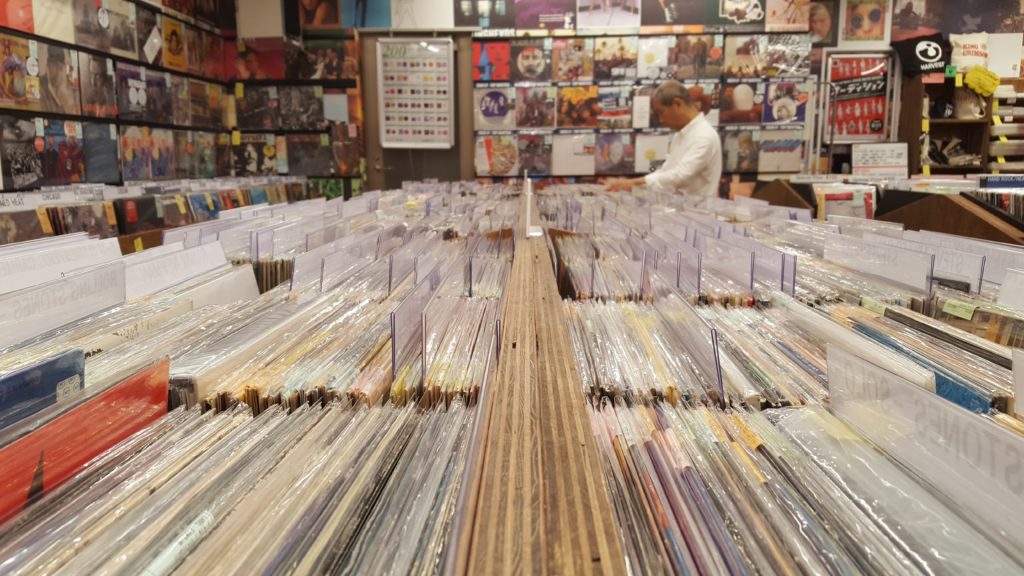
This all started because my boyfriend gave me his old MiniDisc player.
We were watching Techmoan on YouTube, some video about an obsolete tape format, and I mentioned how I wished he would do an episode on MiniDiscs, because they always interested me. Then, my boyfriend told me that he actually had a MiniDisc player (that he never used) and would give to me. It was a wonderful gift from my wonderful little man, but unfortunately he didn’t have any discs for it.
I went to my regular record store haunts scoping the back shelves for used MiniDiscs, but to no avail. After that, I decided to branch out and search some lesser known shops. Still turning up empty-handed, I reached out even further, doing research online to dig up as many record stores as possible, figuring that at least one would have used MiniDiscs somewhere.
It was at this point I realized that I had probably been to at least half of the record stores in and around Tokyo so I figured what would be the harm in hunting down the other half.
So if you find this useful and want to thank someone, thank my boyfriend. It’s all his fault.
And in case you’re wondering, no, I never did find a damn MiniDisc.
Tips For Getting in the Groove
I wrote a guide to Tokyo record shops a few years back, this is much bigger, so much so that I had to break it down into sections. Part One covers the stores in the heart of the city. Part Two covers some choice stores west of the city that you can reach via the Chuo Line. South of Tokyo is covered in the Part Four, with Part Five covering the North. Odd and sods make up the final section. But don’t skip that one, some of the best stores are in there. Also, all store links go to their location on Google Maps and not the stores’ websites. Most of them don’t have any English information anyway.
Some quick tips I’m carrying over from my previous guide:
Get Mobile Wi-Fi
If you’re a tourist trying to make your way around this city without some sort of GPS then you’re a fool and you’ll end up hating your trip. Bring your phone (turn off all mobile data of course) and rent yourself a mobile wi-fi hotspot. There are dozens of providers out there who will gladly hook you up, and it doesn’t cost that much. For 10 days mine was less than $100. Just be sure to reserve one before you arrive. That way you’ll have it ready to go from the get go.
Get a Pasmo/Suica Card
With GPS and Google Maps (despite its many faults), making your way around Tokyo via the train system isn’t all that hard. You plug in where you want to go into your phone and follow the directions. But having to calculate train fare each and every time would be a nightmare. So, on your first day here, go to a train station kiosk and get a pass card. Charge it with a good amount of money (5,000 to 10,000 yen) and then you’ll be set for a few days. You can even use it to buy snacks at most convenience stores. Oh and speaking of convenience stores…
All 7-11 ATMs take international debit cards
So calm down and don’t carry a shitload of cash with you. The fees aren’t outrageous. And trust me, you’ll be able to find a 7-11 when you’re out and about. You’ll have a harder time not finding one.
Pay By Floor
On any massive store, treat each floor as a different store and pay at the register there. Otherwise the alarms will go off and a tiny Japanese person will be very angry with you.
Almost No One Speaks English
I thought this was true in 2012 when I was here on vacation and holy shit since I came here as an English teacher I can doubly confirm this. Don’t expect help from anyone if you’re lost.
Artists Are Organized by First Name
So David Bowie would be under “D,” not “B.” There, I just saved you five minutes of confusion.
So let’s get down to it.
Part I – In The City
Tokyo is massively huge. Seriously. It’s gigantic, enormous, vast and immense.
It’s big.
If you’re going to try and hit up as many stores as possible, I recommend devising some sort of game plan. If I was you, I would start by exploring the main areas of the city. They’re all easy to get to, and you’ll most likely be staying at least somewhere near one of them while you’re here, making it a breeze to make a quick pit stop at your hotel when you buy too many records (you’ll buy too many records trust me).
With that in mind, I thought I’d start things off by covering the biggest stores in the biggest areas of the city. Not all of these are the best stores in Tokyo, but they’re the most convenient and still often worth your time.
Shinjuku
When you visit Tokyo the odds are the first place you’ll end up is Shinjuku, the heart of the city and home to Shinjuku Station, the largest and busiest train station on the planet.
Shinjuku is a literal city onto itself, with countless neighborhoods, each with their own flavor and style. There’s Golden Gai, the bar district filled with an seemingly endless number of crazy little dive joints. Kabukicho, the seedy red light district where anything goes, and there’s Ni-Chome, Tokyo’s gay district, where…well, I can’t tell you what goes on there because my mom will read this. Let me just say it’s an education.
Anyways, just around the corner from Ni-chome is where we’ll start this journey, a shopping district adjacent to the eastern side of the Shinjuku station. Nestled in this area, surrounded by clothing stores, pachinko parlors and various bars, are over ten record stores, nearly all of which are part of the same massive chain of Japanese records stores known as Disk Union.
Disk Unions are all over Tokyo, some are genre-specific, while others are more general stores catering to larger audiences. Nearly all of the stores in Shinjuku are of the former; niche stores designed to appeal to incredibly niche demographics. So if you find yourself with a niche interest that’s covered by one of these stores, you’ll really be in luck. Also, if you have just one day to browse record stores in Tokyo, make it your top priority to come here. The sheer variety of the stores guarantees a diverse selection.
Disk Union’s own website has a map and while it’s good for the basics, I thought I’d go into a bit more detail about what you can expect at each one.
The Shinjuku Disk Unions
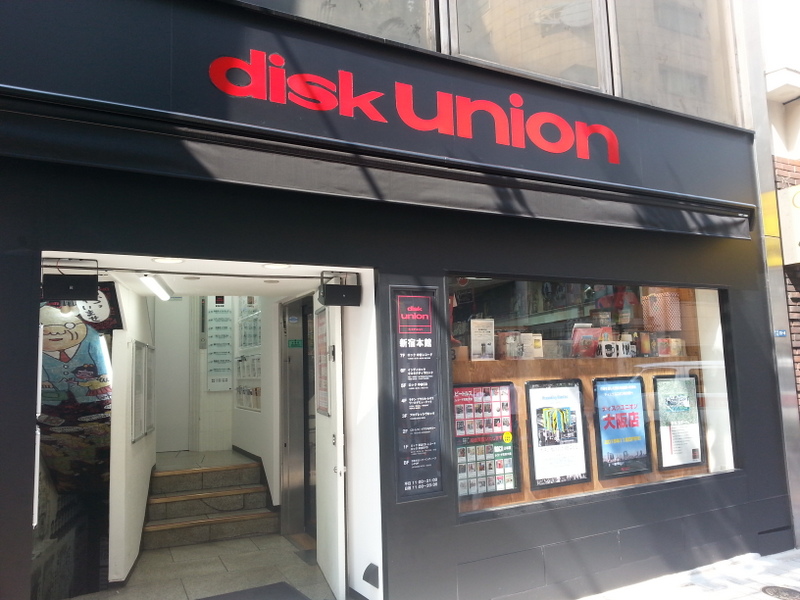
The flagship Disk Union is an eight story monolith located not two blocks from the station proper. Each floor is dedicated to something different, and while they’re all a bit on the small side, they all manage to not only be incredibly easy to navigate, but but jam packed full of records and CDs too.
Let’s start from the top and work our way down. Sitting on the seventh floor is the relatively new punk and hardcore store, which was previously in a separate building located a few streets over. Nice selection here, with little to anger punk snobs. Don’t come here looking for Green Day or Blink-182. The poppiest band I’ve ever come across here was Against Me. This truly is a home for the hardcore.
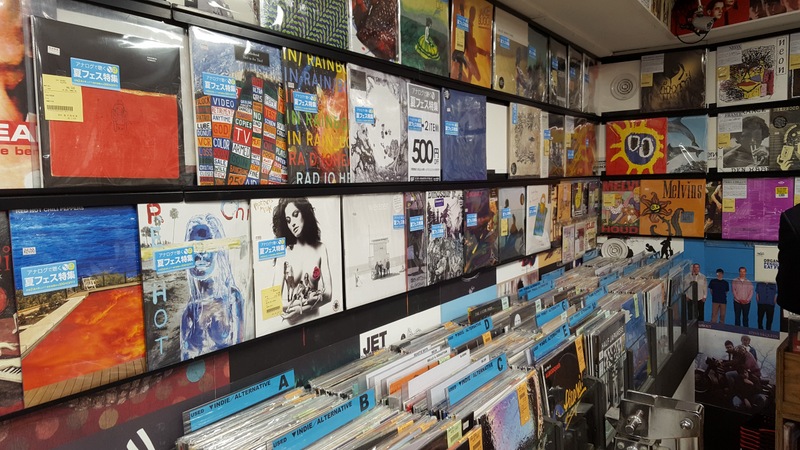
Down to the sixth is the alternative/indie floor. This is where you’ll find most of the poppier punk records too mainstream for the punk floor, as well as your 90s rock, more recent indie fare, and a wide variety of avant-garde and experimental stuff from the 70s to today. A fantastic selection for sure. The used stock is cycled pretty frequently, and they always dedicate a healthy amount of their floor space to new records. Their CD selection is nothing to sneeze at, but the main draw here is definitely the vinyl, it takes up most of the store. Sometimes the prices can be on the high side, but you can still occasionally get a deal if you look hard enough. They put quality stuff on clearance from time to time.
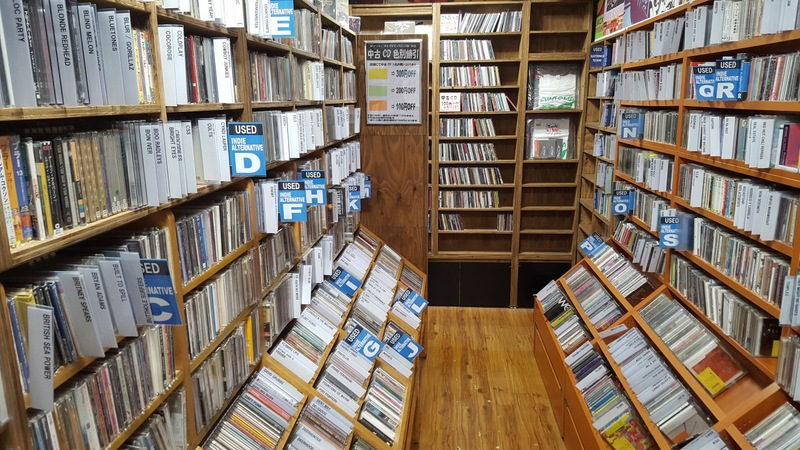
On the fifth floor you’ll find used rock CDs, sticking mostly to stuff from the 60s, 70s and 80s (or from artists whose commercial/critical peaks were at that time). Lots of stuff here, but you don’t need to travel to Tokyo to get Rolling Stones CDs, so this will probably be a pass for most people. Caveat for those looking for weird audiophile stuff like Mobile Fidelity Sound Labs gold CDs, you’ll often find them on sale here.
Latin, reggae and other world music genres are housed on the forth floor. I know nothing about these genres! So this store could house the greatest selection of reggae and calypso music on earth for all I know. If you’re into these genres, yo.
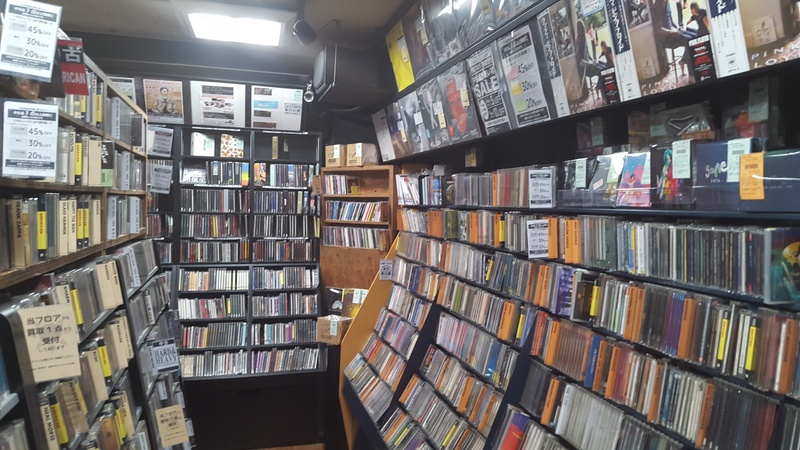
If you’re like me though, you’ll probably sail right on by the forth floor and dive deep into the third. Set the controls for the heart of the sun and take a journey to the center of your mind, this is where you’ll find all the prog rock your drug-addled mind can possibly handle and then some. With the entire floor organized by country of origin, it’s just as easy to track down your favorite Magma CDs as it is to browse ELP’s back catalog. And the girth of their selection is just as mind-blowing as a Keith Emerson keyboard solo. Want a copy of Roundabout by Yes? Great, which one? They got the SACD, the recent CD/Blu-ray combo, the MFSL CD or a barebones release from the mid-80s. Prog fans beware: this store is dangerous to your wallets.
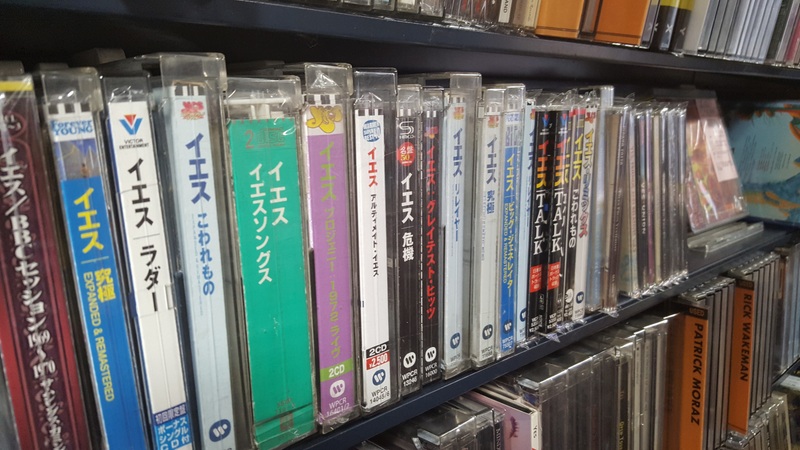
Down on the second there are no records at all, instead you’ll find a nice variety of record goods, from storage solutions to record cleaning devices, cartridges and slipmats. Not the kind of thing I’d probably buy if I was just visiting, but as a local I can tell you that their record shelf selection is top notch all the way.
The ground floor used to be dedicated to new releases of all genres, both CD and LP. However, in March of 2019 the entire floor was gutted and replaced with a Disk Union-owned bar. I can’t imagine why this decision was made, as it makes tracking down new releases much more difficult. Now you have to go to each individual floor to see them. The store is still a must-visit, of course, but it’s still a bummer to see such a great store taken down a notch for such a stupid reason.
Below the bar is more music though. The basement is home to Japanese rock and pop music. I’m a pretty big fan of Japanese music, but I honestly don’t find myself coming down here all that much. The focus of this store is a little odd. I think its purported goal is to move new and used items by bands from the 90s to today, but I often find older stuff in here that just isn’t all that interesting Worth a stop in for sure, but don’t expect all that much.
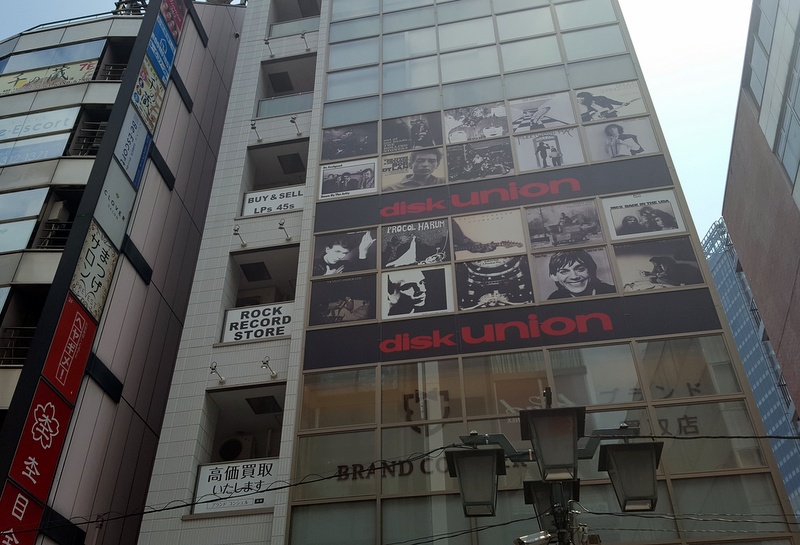
Directly across the street is the newest store in Disk Union Shinjuku family, a massive two-story shop dedicated solely to used rock vinyl. This is basically the expanded, vinyl only version of the used rock CD floor in the main building. If you’re looking for anything on the mainstream end of things that came out between those two decades, hightail it here pronto. Fantastic selection on both floors, although with the only access between them being an elevator, waiting to move from floor-to-floor can be a frustrating experience on occasion.
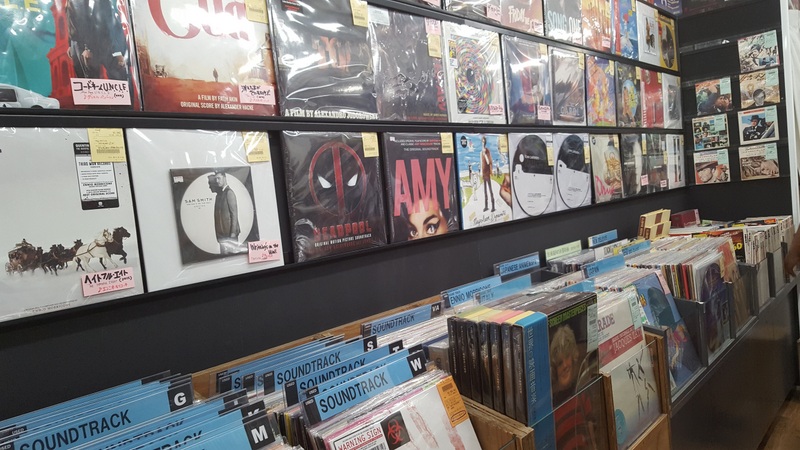
Down another block and back on the other side of the street is another building that hides three more great, if smaller, stores. Up on the fifth floor is the heavy metal store. Mostly CDs here, but they got a shitload of them, and its all very well-organized and divided into the genres you’d care the most about. Then down on the third you have the “cinema” store. Long ago this was part of the main building until it too outgrew its narrow confines and needed to expand. I wish it would expand more. This is a treasure trove of soundtracks, both on CD and LP, used and new. I’m constantly amazed at what I uncover here, whether it’s the latest limited edition soundtrack re-issue, or if it’s a vintage soundtrack to an obscure horror movie from the 80s. They carry game music, but don’t expect a massive selection, especially on vinyl. You can find some DVDs and Blu-rays here too, but double-check those regions! Most DVDs sold here are region 2, meaning they won’t play in the states. Any Region A Blu-Ray should be fine though.
In the basement there’s the Showa store. For those unaware, Showa is the name given to the time period in which Emperor Hirohito reigned, from the mid-20s to the 1980s. In reality though, this usually just means the post-war era up to the mid-80s. Looking for vintage Pink Lady LPs? Here you go! You can actually find all kinds of crazy stuff and I recommend anyone with even a remote interest in Japanese culture check this place out. It’s more than just outdated idol music, there’s some good electronic rock and insane amount of vintage anime soundtracks here as well.
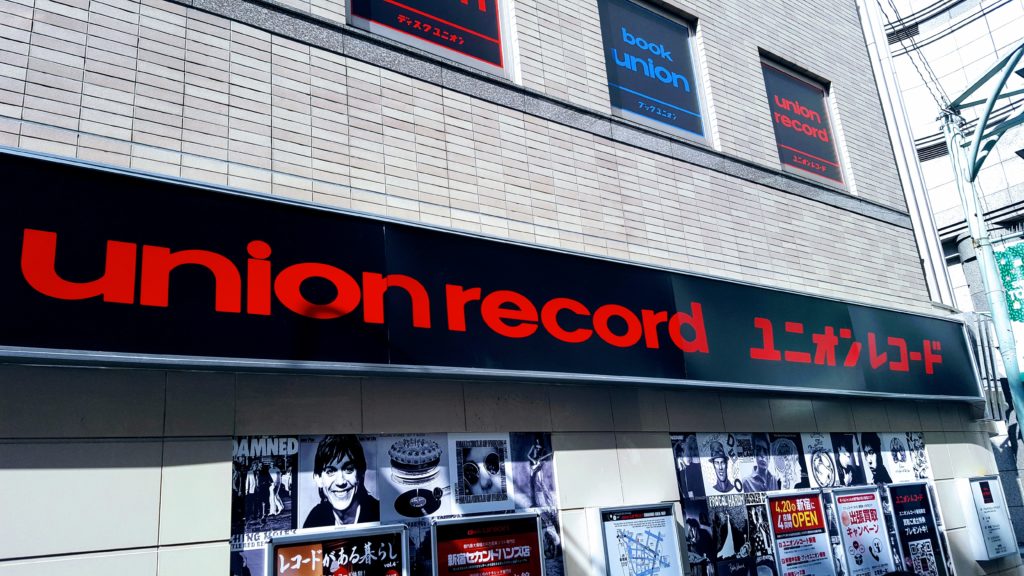
Relatively new to the area is the Union Record store (named after what Disk Union was calling itself some 50 years ago). It’s not on the main drag, but it’s still easy to find, just one block down. This store is four floors, but it’s much roomier than the seven story main store. The first floor is a general used records store, with a smattering of everything both foreign and domestic. The second floor is dedicated to used rock CDs, while the third is solely made up of Jazz CDs and LPs. The fourth floor is a combination of club, soul, hip-hop, and dance music. The Jazz and club stores used to be separate locations on the main street, and while those stores were fine, they’re much better now that they’re under one roof. They’re far bigger, allowing not only for more stock but more walking room. The old stores were so cramped it was hard to get in them on busy days.
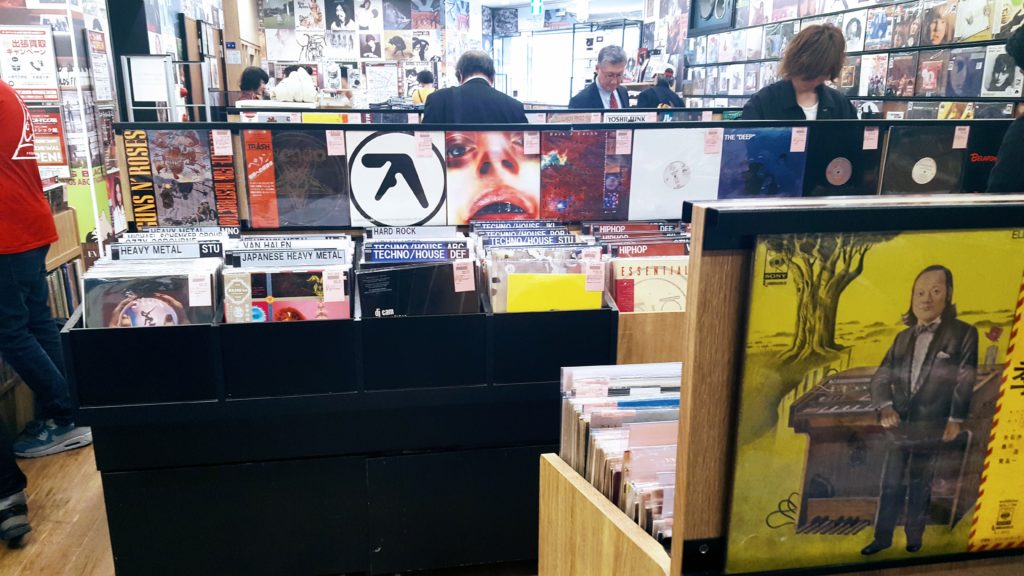
Finally, there are two more Disk Unions nestled atop the eighth floor of the Kinokuniya building, about two blocks from the Union Record store. Here you’ll find yet another all-purpose used store, as well as a classical store alongside it. This all-purpose store changed locations in early 2018, and to be honest it kind of suffered as a result. The newer location is a bit smaller, so its a bit harder to navigate. It’s a still a stellar store though, frequently stocked with hidden gems you might not find otherwise. It also has a good selection of DVDs and Blu-rays from various regions, so it’s worth checking out for that too.
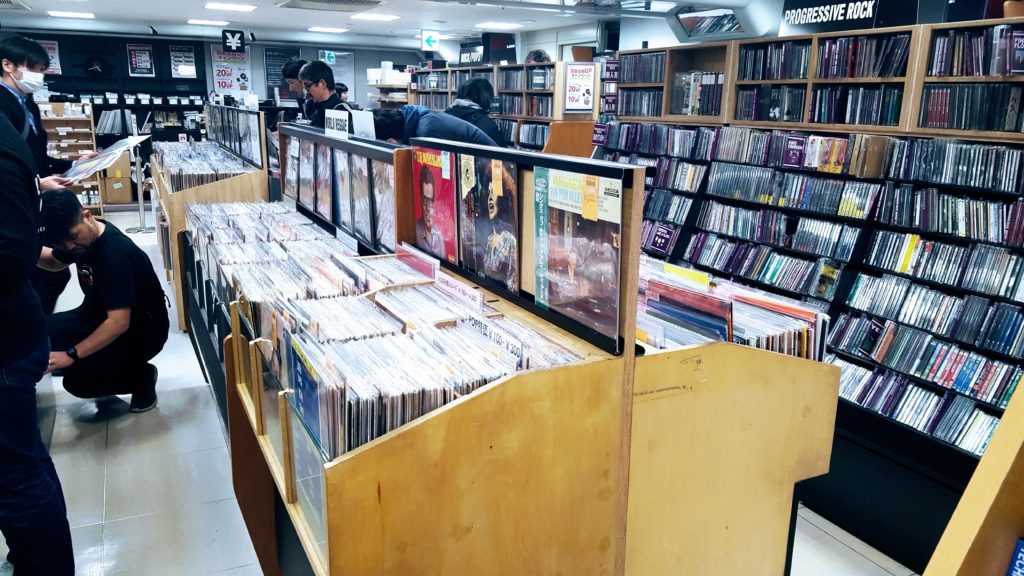
That does it for all the Disk Unions, but there is a even more in Shinjuku. Firstly, there’s the Tower Records in the Flags department store building, which is attached to the JR Shinjuku Station. I’ve always enjoyed frequenting this store, but in the past I rarely recommended it to tourists as it didn’t have anything the larger Shibuya location didn’t already have.
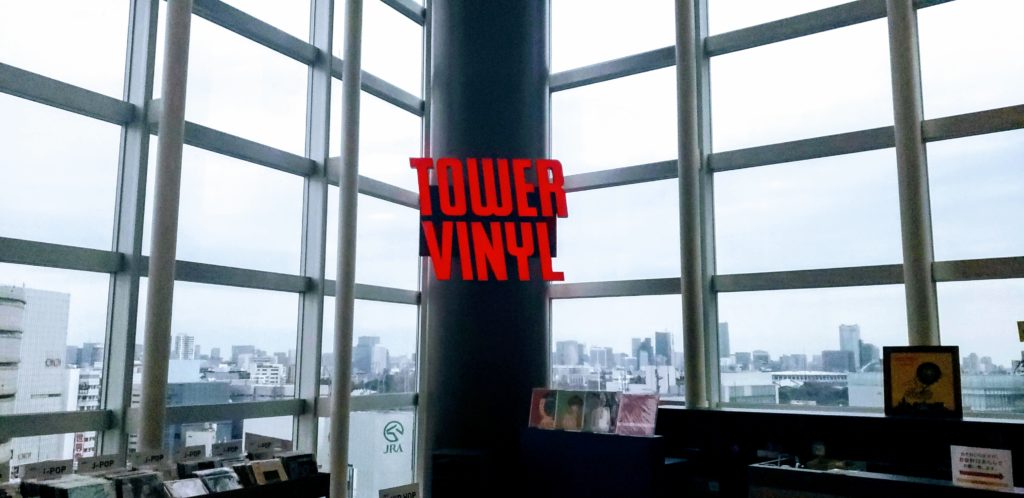
But that’s no longer true. This March, the location underwent a massive renovation. The top floor, previously reserved for classical music and movies, has been transformed into an all-vinyl retail space carrying not only new, but used records as well.
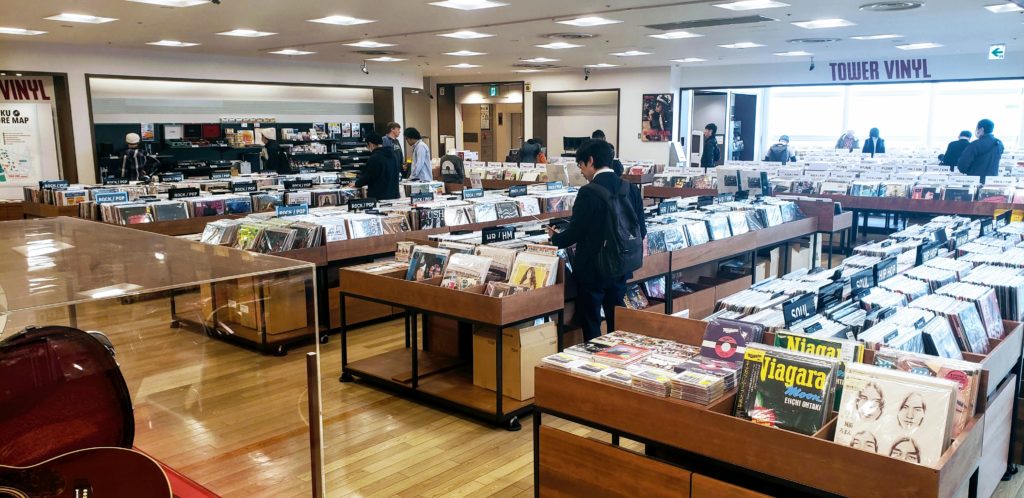
As of this writing, the store has just opened, but it’s already off to a good start. The records are fairly priced, and the selection is stellar. The store is well spaced out too, plenty of room to browse and dig. The only downside right now is that their records could do with a bit more organization. Most record stores in Japan separate rock by sub-genres, but here they elected to throw 90% of the stuff into just general “rock,” with punk/metal the only categories getting their own section. That’s not a deal-breaker, but it does make browsing a little harder. Hopefully they’ll handle this better in the future. Klaus Schulze should not be side-by-side with The Killers, I’m sorry.
There’s also an HMV. down the street from the Kinokuniya Disk Union. Just hang a right and walk for a block or so, it’s in the ALTA Building on the sixth floor.
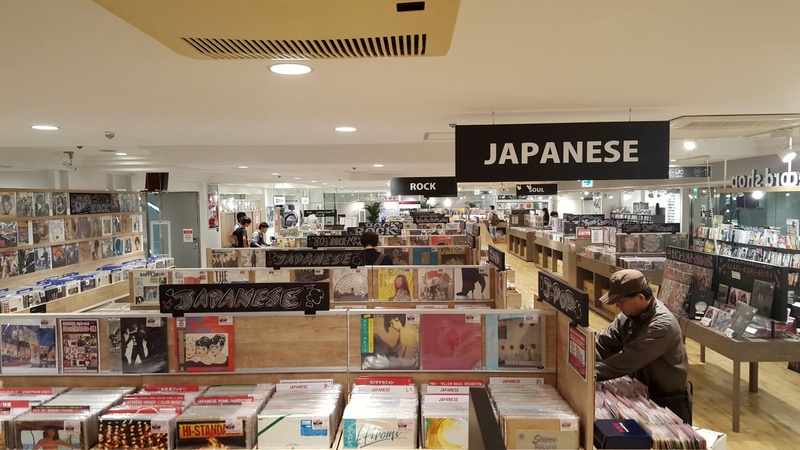
This is probably one the best designed and easiest-to-navigate stores in Tokyo, with plenty of room to walk around and incredibly well-organized and spacious racks. While the Shibuya HMV (more on that in a bit) is one of my favorite stores in Tokyo, I think this one is even better. The selection here is light years beyond what you’ll find at the Shibuya store. There are a lot more used records here, and all put together in a much better fashion. Head down to the Progressive Rock section, for example, and you’ll find three Pink Floyd placards; one for domestic releases, one for US, and a third for other international pressings. A lot of stores only reserve such specialization for The Beatles and The Stones. And if you like reggae, club music, soul or heavy metal, you’ll be happy to find they all have their own sections with plenty of choice records. They even have a separate 12″ singles section!
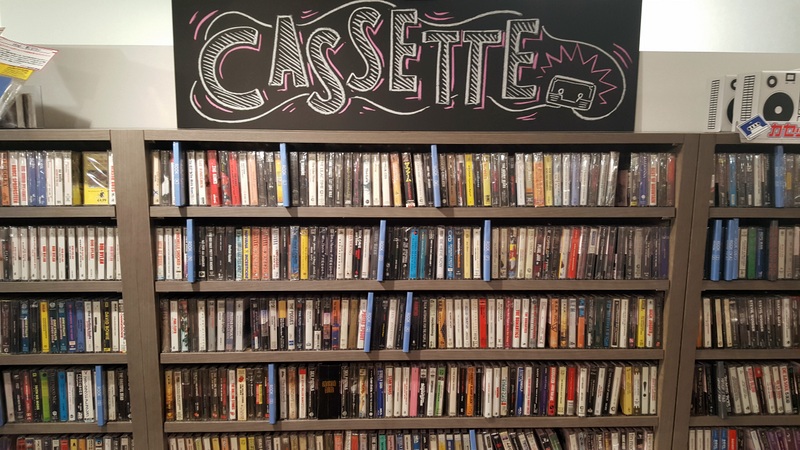
There are also a ton of cassettes here. Now, I’m usually the first to sully any attempts at tape collecting, but I’ll be honest, their tape section is so well-maintained and visually-appealing that even I was tempted to pick up a few.
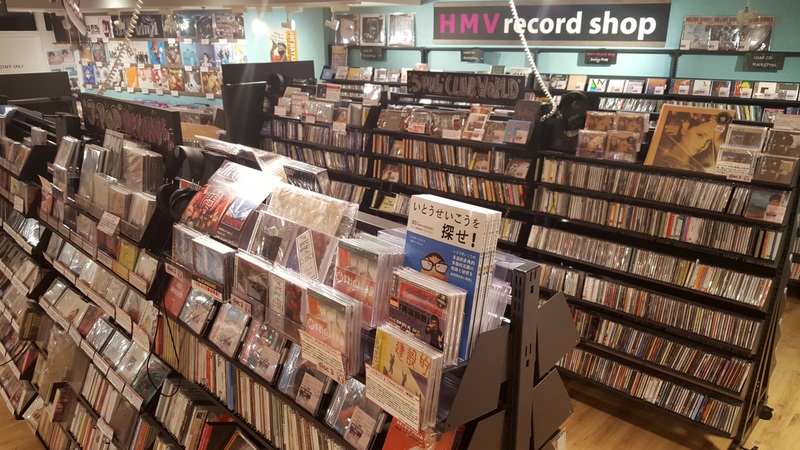
If I had to complain about this place, I’d say that the CD selection is a little sparse, with neither a substantial amount of new nor used product on the shelves. Not that big a fault however, if you’re looking for CDs there are plenty of stores in Tokyo that specialize in them. This is obviously a vinyl-centric place.
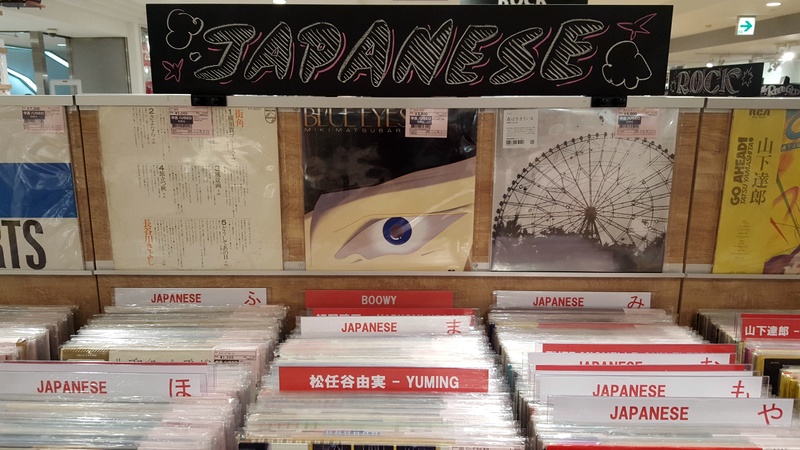
There’s one more area of interest in the greater Shinjuku metropolis, called Shinjukunishiguchi. It’s a separate area of Shinjuku located northwest of the main station. It’s north of the HMV, and the easiest way to get close it is is to head back underground and take the D6 exit.
This area is somewhat known internationally for its massive abundance of record stores. Multiple micro-stores often inhabit singular buildings, with some floors even housing more than one store. You often hear about this area when reading about record stores in Tokyo, and a quick visit to any store and you’ll find countless autographed photos of famous rockers who popped in for a visit.
I don’t know why though, because here’s the thing; almost every store in Shinjukunishiguchi is shit.
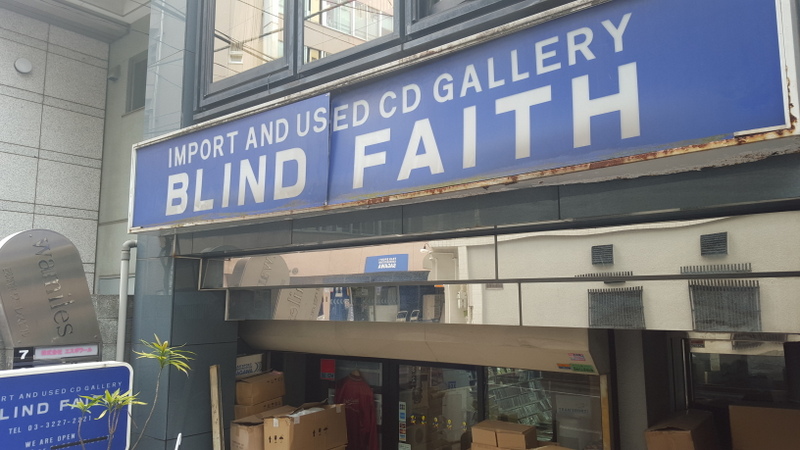
It broke my heart to find this out, as, like I said, the area is renowned around the world for being a mecca for record collectors. But I can’t fathom why, as more than half of the record stores here sell nothing but bootleg live CDs and that’s it. And they’re bootlegs of recent gigs too. Def Leppard 2012, Yes 2014, stuff like that. And they’re all ridiculously overpriced, I’m talking 3,500 to 6,000 yen a pop. It’s 2016 y’all. If you’re paying an arm and a leg to get concert bootlegs on CD, you’re fucking up. This shit is online and it’s free. Do some detective work and you can find most these albums there instead. I guarantee that’s where most of the bootleg labels are grabbing them.
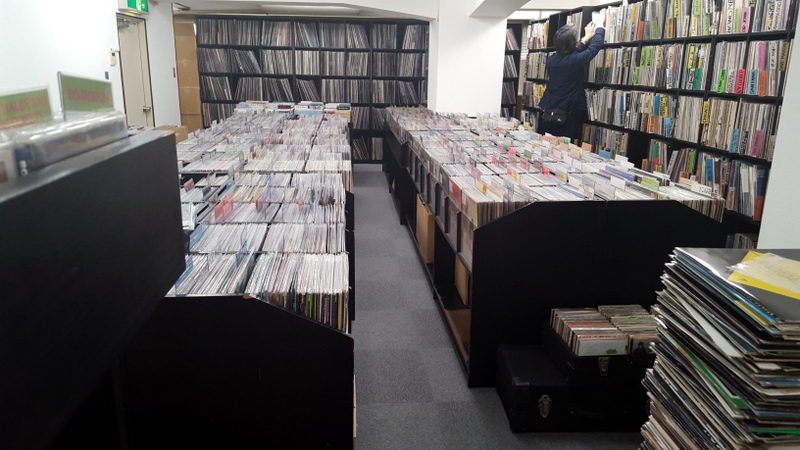
One of the biggest non-bootleg stores in the area is a store that simply goes by Vinyl. I think at one point they may have had two locations, and in fact they still might, but I couldn’t find the other one the last time I went there (this area is kind of a labyrinth). It doesn’t really matter though, I can’t recommend either. Sure, Vinyl is a huge store that lives up to its name, it’s stocked to the ceiling with records, many of which are hard-to-find, even in Tokyo. That being said, they’re all hideously overpriced. I did a quick browse of the 80s 12″ singles there, and most were priced two to ten times what they go for on Discogs or even eBay. It’s just outrageous. I can’t tell who this store is exactly preying on, either stupid foreigners who are easily impressed, or record-obsessed locals who don’t know any better. Either way, they’re exploitative as hell and I can’t begin to imagine how they’ve managed to stay in business. If you’re on the lookout for one specific record to fill a hole in your collection and you don’t care what you have to pay, then maybe check this place out, otherwise, steer clear.
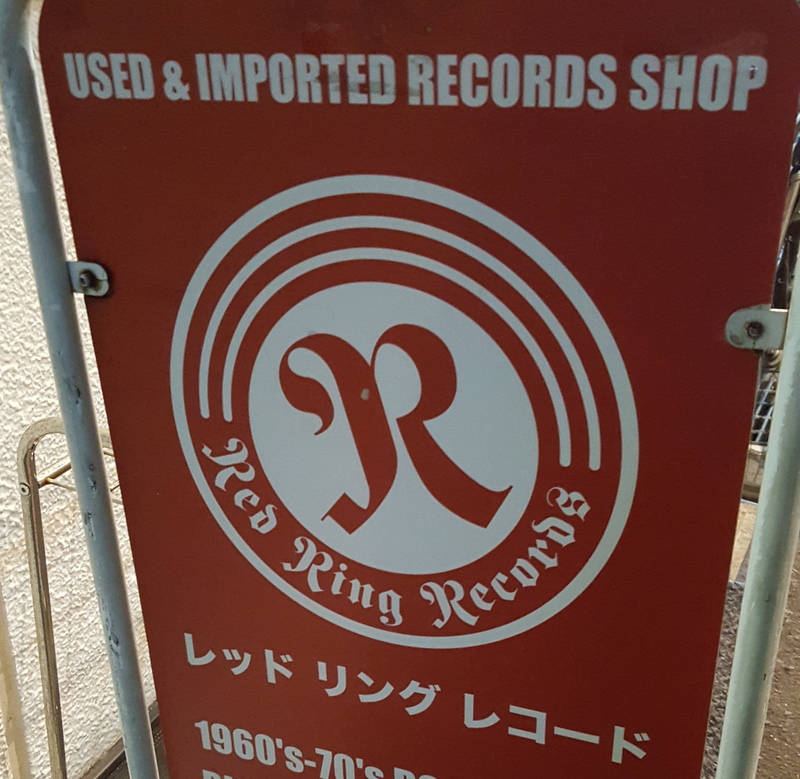
However, there is one store in Shinjukunishiguchi that’s a must-visit, and that’s Red Ring Records. Its advertised focus is hard rock and prog, and while they have both in spades, they’re also not at a loss for other genres. I picked up a handful of fantastic Frankie Goes To Hollywood and Pet Shop Boys singles here, and paid less than 500 yen each (a third of what they cost at Vinyl). I feel like this is a store whose inventory runs deep, so be sure to dig when you go here, I bet you’d find some real gems at steal prices.
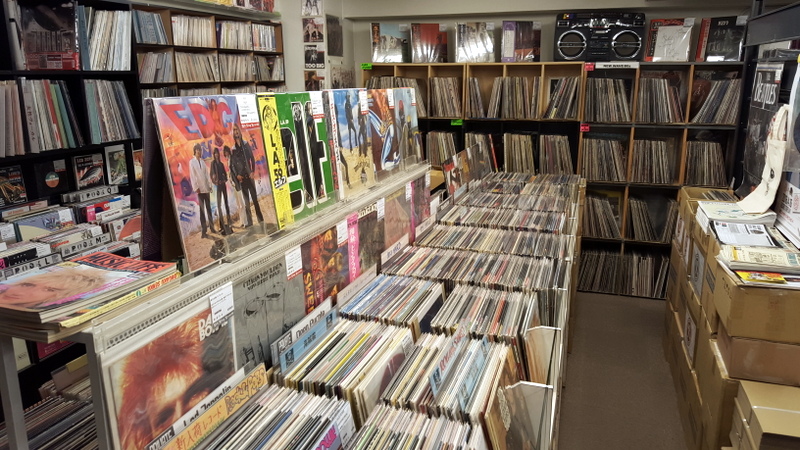
Aside from that one highlight though, I can’t recommend anything else in this area. The remaining stores that specialized in legit product that I managed to find were all just a little too small and cramped, even by Tokyo standards, with many far too messy and unorganized to make crate digging an enjoyable experience. A good number also weren’t open during their advertised hours, even on the weekends, which is a clear sign to me that they don’t want my money. Sure, if you’re going to make the trip for Red Ring Records (which I suggest you do) then you might as well take a peek, but don’t get your hopes up.
Shibuya/Harajuku/Naka-Meguro
Shibuya is the shopping district of Tokyo, known the world round for its fashion boutiques and endless department stores. It’s also where you’ll find Harajuku, the youth capital of Tokyo, where schoolgirls frequently conglomerate in outfits so colorful your retinas might just burst from overuse.
It’s one of the most tourist friendly areas in Tokyo, with English signage and English speaking staff at many of the larger stores. It’s excessively bright at night and even the skeeziest back alleys and bars are safe. If you want to take the whole family on a shopping trip and find something for everyone, this is the place.
Just be prepared to pay a lot. Tourist friendly comes at a cost. Stuff here tends to run a bit on the pricey end. The price of convenience.
If you’re interested in buying new music, especially on CD, the first place you should head for here is the Tower Records that’s not too far from the station. Head out the station via the Hachiko exit and cross the scramble (the giant intersection), staying on the right of the main road. You’ll see it on your right not soon after. At eight stories in height it’s pretty hard to miss.

Just like the Tower Records we used to have back in the states (RIP), the Japanese Tower Records stores deal strictly in new music, so don’t go here expecting to find anything used. Additionally, the majority of what they carry is CDs. They’ve been dipping in LPs a bit as of late, but they still take up just a fraction of the floor space. If you’re not looking for new music, on CD, then you shouldn’t even bother taking a step inside.
But if that is what you’re after, then welcome to one of the largest record stores you’ll ever have the pleasure of exploring. Each of the stores’ eight floors are split up by genre, with J-Pop, western rock, R&B/hip-hop, soundtracks, and classical all getting their own. Furthermore, each floor features plenty of sub-genres and categories to make finding things even easier.
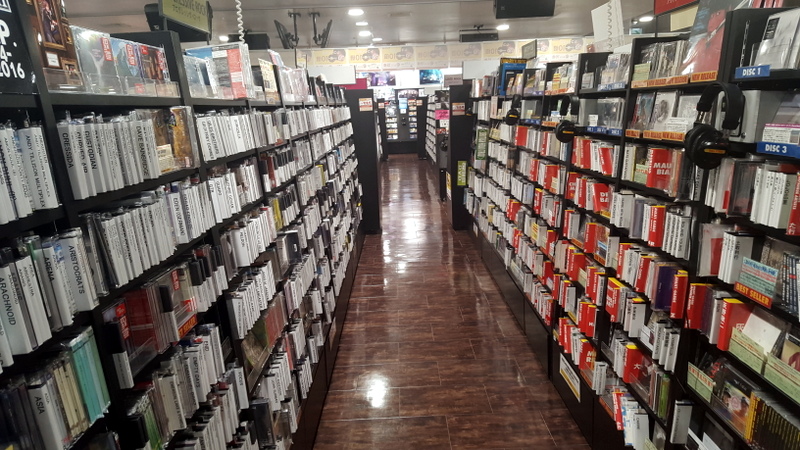
Whenever I’m on the lookout for new J-Pop or J-Rock I this is usually where I go. They’re so huge that they can focus on the smaller acts as well as the big ones, so it’s easier to find groups that might otherwise fall through the gaps. Also, the listening stations are great and well-maintained, making it really easy to listen to and discover new bands. I’ve bought many a CD here by just walking up to a random act’s featured listening station and putting the headphones on. Make sure you give some bands a try while you’re here, you might just surprise yourself. Also be sure to just take in the ambiance, for a massive store run by a major chain, the Tower Records in Shibuya has all kinds of personality, with hand-decorated displays featuring hand-written notes by individual staff members scattered about all the floors. It’s an attention to detail (and a genuine love for music) that you never find in America anymore.
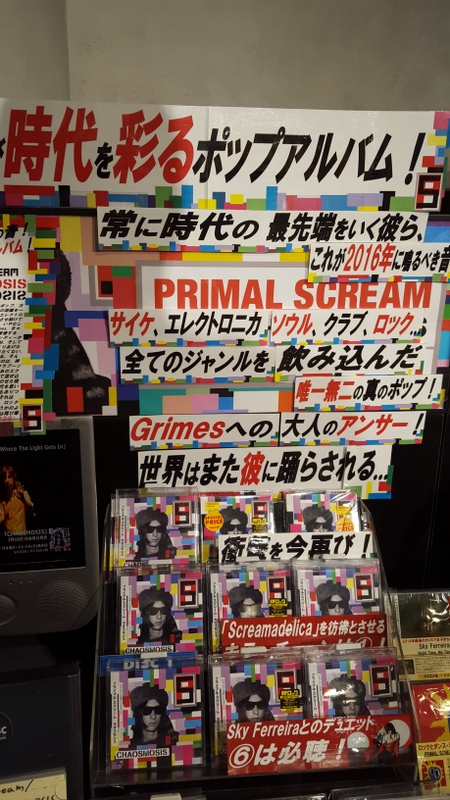
This is the number one place to go for new CDs, but I’m still a bit hesitant to buy vinyl here. While their selection of new LPs has increased in recent months, the prices are pretty high, and the selection is rather shallow, only focusing on the bigger acts and well-known indie darlings. Also, the vinyl is always packed way too tight, making it a struggle to sort through it all. But if you’re looking for new Japanese music, harder-to-find (but still in print) Western releases, soundtracks, prog rock, heavy metal or game music on CD, then book a sizable chunk of your day to dive deep into his place. And get a point card. It’ll pay off if you decide to splurge.
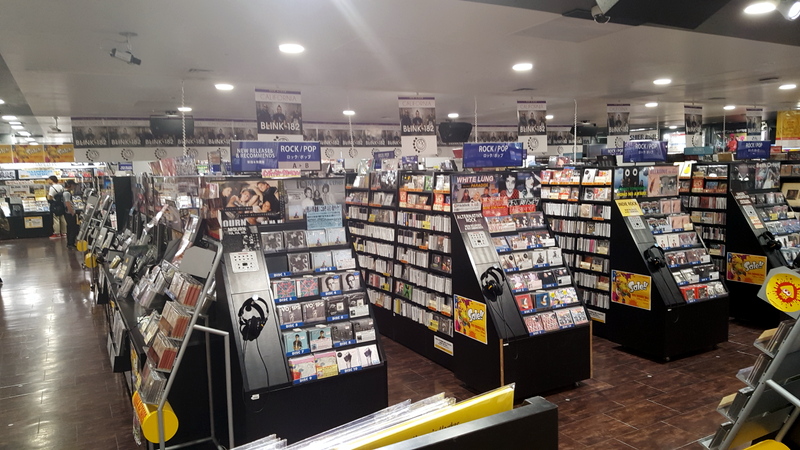
If you’re more keen on buying old LPs than new CDs, don’t fret, Shibuya has you more than covered in that regard as well. Not too far from Tower is a section of the neighborhood that’s downright lousy with record stores both big and small.
First up is the Shibuya Disk Union. Now, a lot of people swear by this place as a great store to find both used CD and LPs, but I’ve never had a ton of luck here. It’s not that their selection is bad, it’s just that it pales in comparison to the other Disk Unions, as well as the multitude of stores in the greater Shibuya area. Still, it is a four story affair with floors dedicated to jazz, club music, and heavy metal in addition to their general used floor. So if any of those genres are up your alley you might want to swing by there. But I suggest only spending a short amount of time there, because this is where you really want to go.
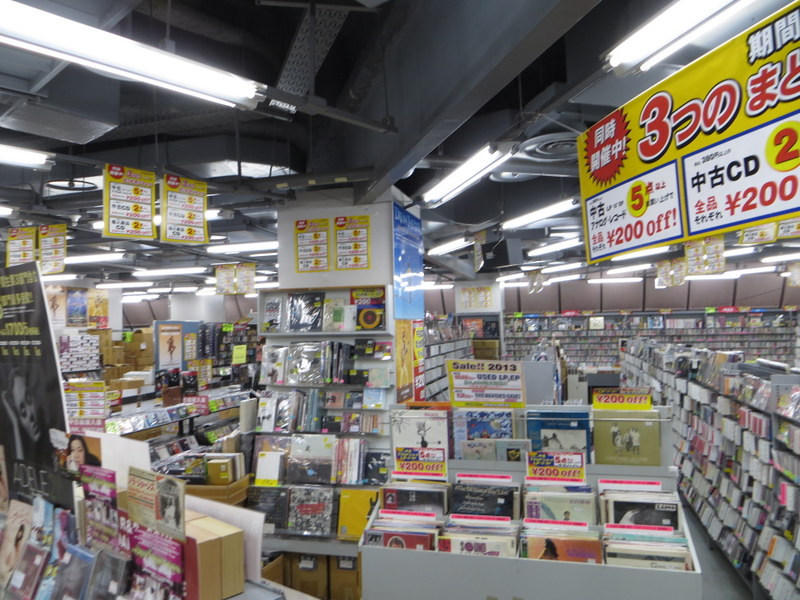
Located on the fourth floor of a rather large retail building is Recofan, which would be the largest record store in Tokyo if it wasn’t for that massive Tower Records down the street (and another Recofan I’ll be talking about later). Recofan is your one-stop music shop, carrying new and used LPs and CDs from both the West and Japan. To be honest though, their selection of new product is pretty sub-standard, you want to come here for the used stuff, as they have a ton. An additional caveat exception to the previous caveat; the records are kind of a mess. Sure, there are sections dedicated to genres and sub-genres (especially metal), but the bulk of their vinyl stock is seemingly completely unorganized, with genres and countries of origin all mixed together. But if you can brave the messy stacks you might find some good deals, lots of high-quality cheap stuff in there. Their CD selection goes deep as well, and you might be able to score some rare and out-of-print stuff among the endless rows of CDs. A great place and a must visit, just be prepared to spend a bit of time there.
And keep in mind that Recofan isn’t the only store in that building that sells music. If you’re into anime music be sure to go to the Mandarake in the basement. It’s music selection is a little sparse, but you can usually find some good anime and game soundtracks there, both on CD and LP. And be sure to check out the Book Off across the street. Their CD section is fairly massive.
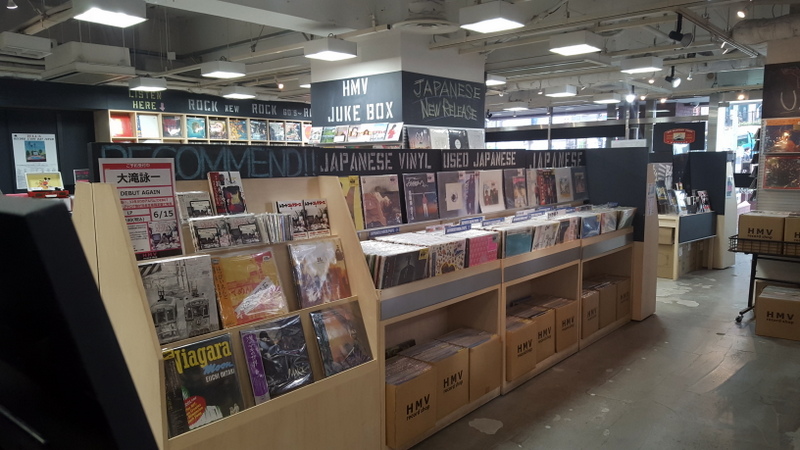
Head up away from the Tower Records and you’ll find a large office building across from Tokyu Hands. Inside there are few stores here, most notably the HMV located on the ground floor. This place is fantastic, so fantastic that I reviewed it last year. Since then, it’s only improved, with an increased focus on vinyl and a much more organized layout that focuses on rotating sales of various genres. They carry new vinyl and CDs, but come here for their used stuff. They got a ton and at incredibly fair prices. Also home to some good vinyl accessories. And be sure to check out that laser turntable!
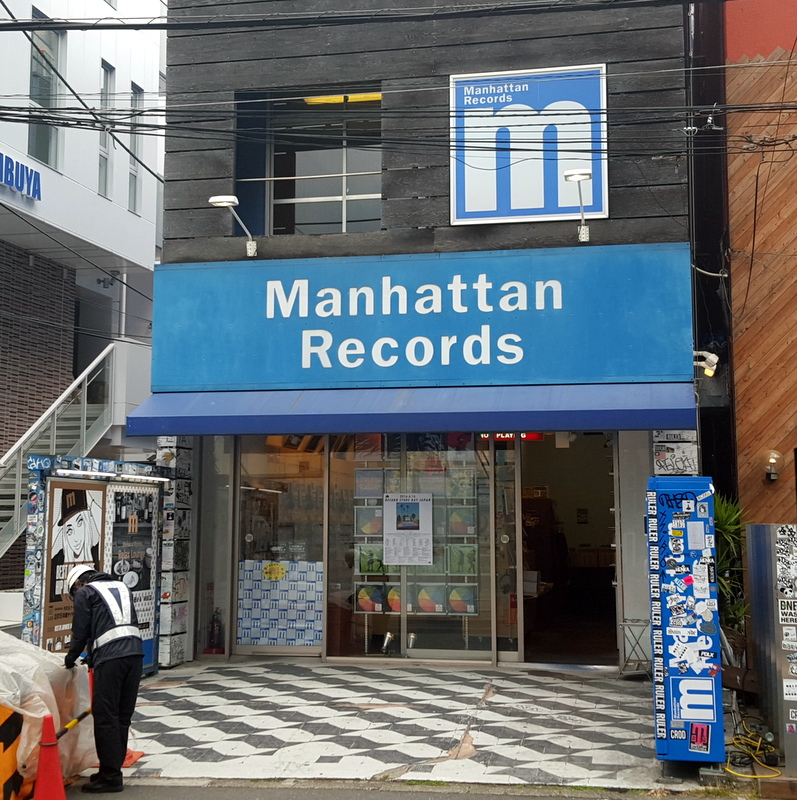
From HMV you have a few more stores to check out in Shibuya, albeit what you get out of them might vary depending on your personal interests. There’s Technique, which is dedicated to dance music, and Manhattan Records, which also focuses on club music, with a tilt towards hip-hop. Both are nice if you’re into those things, but don’t expect much outside of their focus areas.
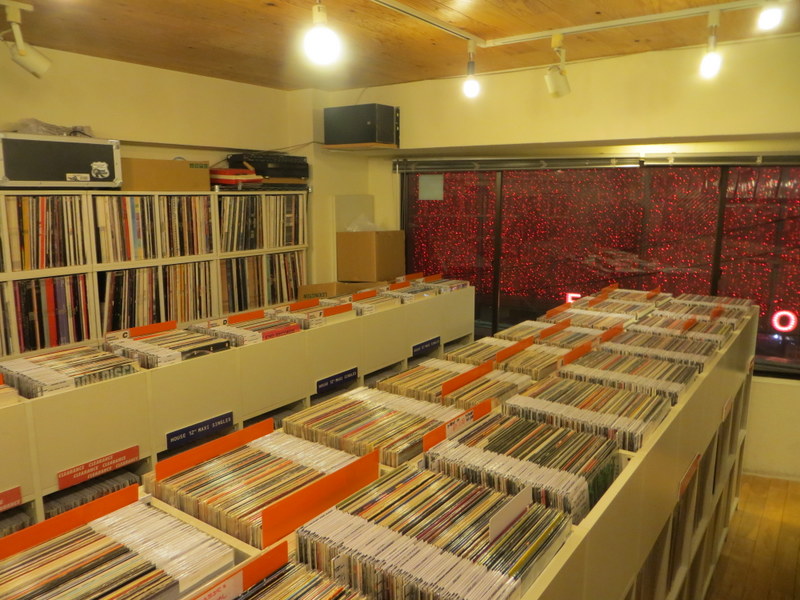
Up the street you have Next Records, which is a haven for 12″ singles of the classic disco and pop variety, until you see the prices, which are often double or more what they go for on eBay. It’s one of the few stores in Tokyo I outright hate, can’t recommend it. I’m really just putting it here as a warning. Across from them is Face Records, and while they’re a tiny little mess of a used records shop, it’s worth a stop, their selection can be diverse and their prices are quite affordable.
Nearby all these stores is the PARCO department store, which was heavily renovated in 2019. As part of the renovations, a Union Record moved into the basement floor. It’s a bad record store. It’s far too tiny, and filled only with mainstream and middle-of-the-road fare (“Terrible, and in such small portions.”) If you get stuck in PARCO while your significant other is out shopping for Gucci, then you might as well check it out, but there’s no reason to make the trip there otherwise.
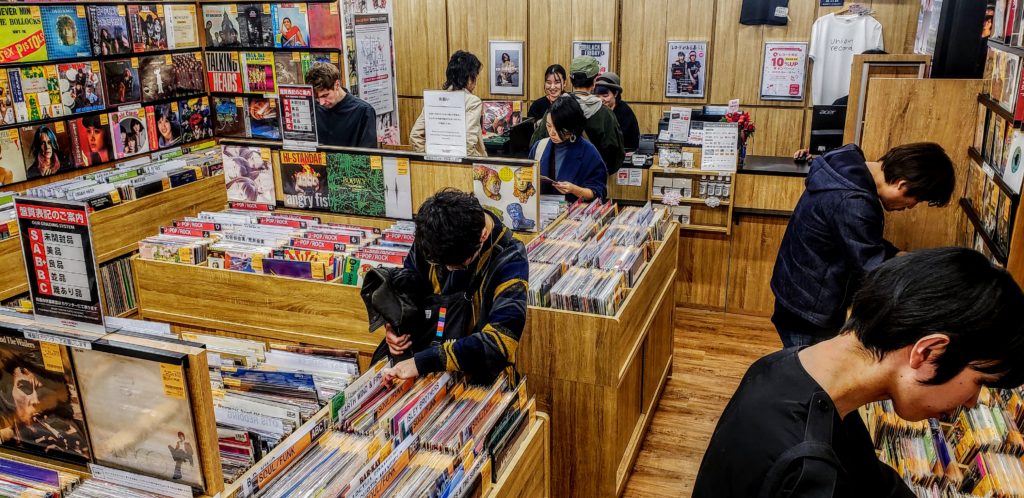
From there you can head north towards Harajuku. It’s not a far trip by foot, and I recommend the walk strictly so you can see all the cool stores and and other interesting sites around the area. There is one record store along the way, the tiny Hi-Fi Records, which mostly deals in jazz so I only recommend it if that’s your thing.
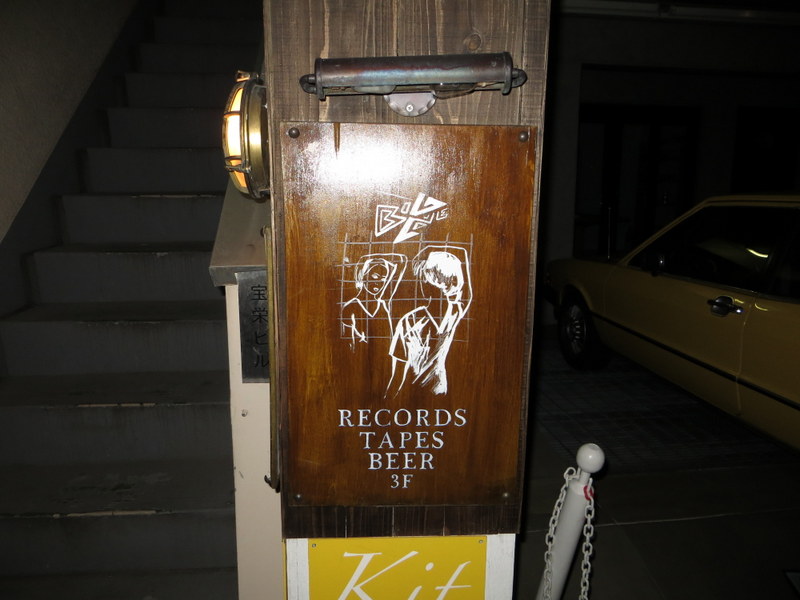
Strangely, while Harajuku is a bastion of youth culture, it doesn’t have all that much in terms of record stores. In fact, I only know of one, but it’s a hell of a store. Located square between Harajuku station and Kitasando is Big Love Records, a great little store tailored toward indie and underground music. This is a store with a lot of personality, jam-packed with an idiosyncratic selection of LPs across many lesser-known and niche genres, from 80s electro to modern noise rock, in addition to new LPs from more “major” indie acts like Fucked Up and Ariel Pink.

I can’t even find the words to describe this store’s aesthetic. It’s kind of equal parts mid-90s indie record store and part Portland hipster hell (but in the good way, seriously). If your tastes skew to the out-there, obscure or alternative at all, this store is a must visit. They also serve beer.
A bit out of the way from Shibuya proper is Naka-Meguro, a trendy commercial/residential area home a large number of boutiques and high-class shops. You can get to Naka-Meguro station easily from either the Shibuya or Harajuku stations via the southbound Fukotoshin line. From there you’re just a few minutes walk away from Waltz, a beautiful little record store with a hell of a hook – it specializes in cassette tapes and tape decks.
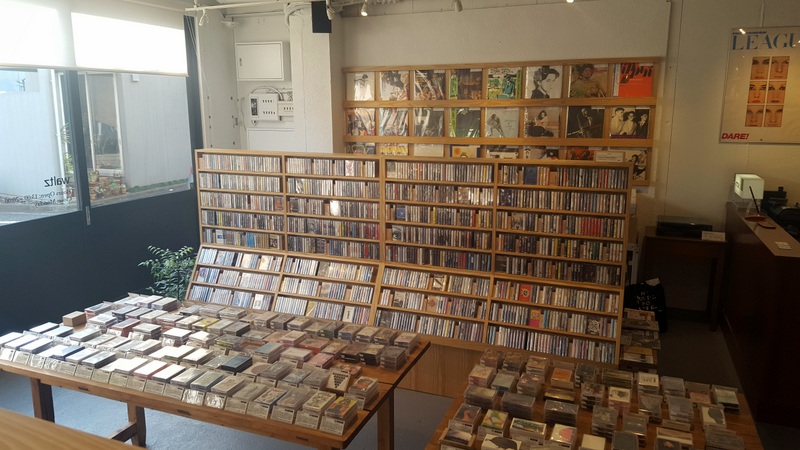
Now, I’m not going to pretend to be a tape enthusiast. I’m very much not. I only buy tapes when the release in question is exceptionally odd and hard to find on any format (like my Dragon Quest in Brass tape). But I have to admit that Waltz nearly sold me over on the format thanks to its charm and undeniable style. The center of the store is dedicated to new releases on tape, both from Japan and abroad, while the shelves surrounding them focus on vintage releases. The entire layout is remarkably well thought out and easy to navigate. And it all just looks great. The back of the store features a few vintage boomboxes for sale, although expect to pay a premium for them. and there’s even a listening area where you can try some releases before you buy them.
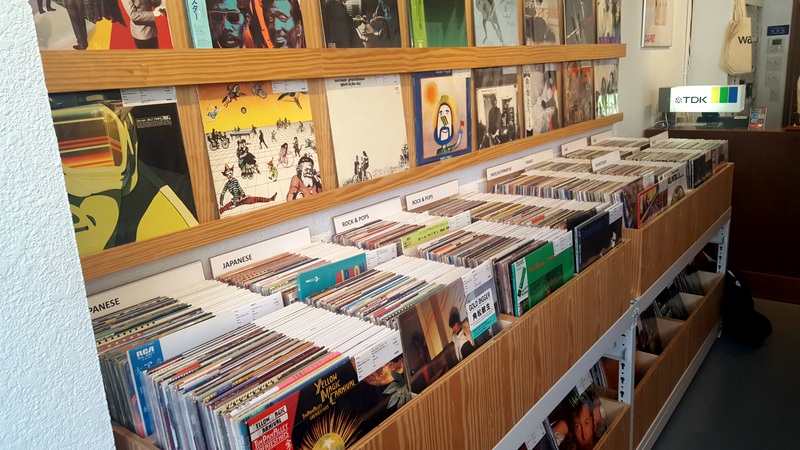
They do have a vinyl selection, and while it is a bit on the small side I will say that I was very impressed by it. What they have is obviously well-curated, and matched well to my interests with lots of 80s Japanese pop and a good number of soundtracks. They also have a pretty hefty world music selection if that’s your thing.
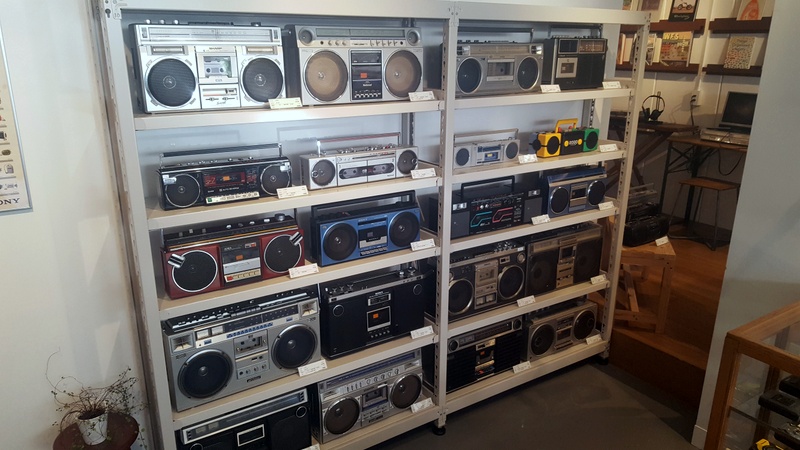
This place is a must visit for tape enthusiasts, and highly recommended for everyone else, just for the atmosphere alone.
If you’re in the lookout for hip-hop and electronic music, and don’t mind a bit of a walk, there’s one more record store out here that’s a must visit: Jazzy Spot, located in the sleepy Gakugeidaigaku area. You could hike back to the Naka-Meguro station, but it would honestly be quicker for you just to walk there. It takes about 20 minutes.
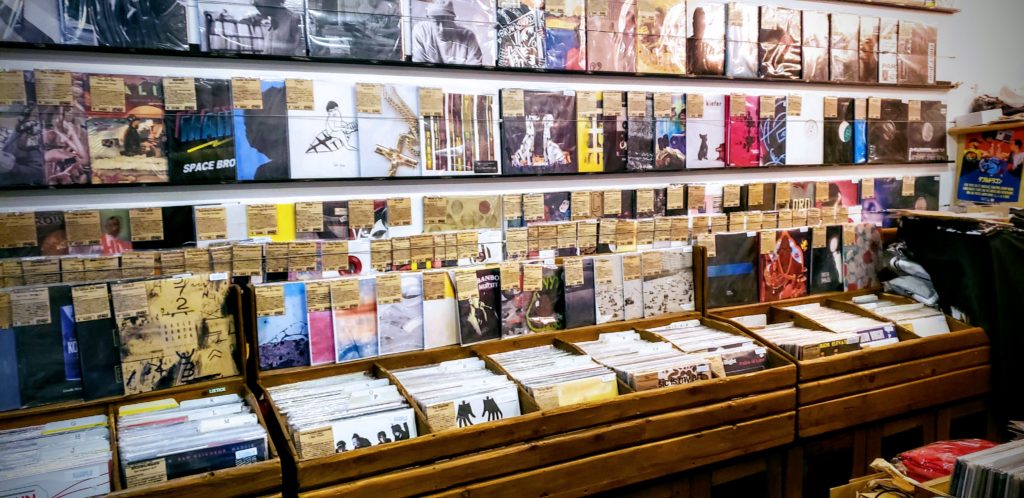
Jazzy Spot is a fantastic place, that has found its niche and made a home in it. Tons of hip-hop here, as well as nu-break jazz and various other sub-genres of electronic music. The store does skew more towards the hip-hop and club end of things, you’re more likely to find Flying Lotus than Aphex Twin here, for example, but if that’s your cup of tea, then this is a dangerous place for your wallet. They carry stuff you just won’t find at other places in Tokyo, especially since the hip-hop centric Coconuts Disk in Yoyogi closed down.
Ikebukuro/Mejiro
Ikuebukuro isn’t hip, trendy or cool. It’s as commercial as you can get, filled with department stores, discount clothing stores and mainstream chain restaurants. Want to eat at T.G.I. Fridays while you’re in Japan? Ikebukuro is the place.
As such, it’s not really a place I would recommend for casual tourists. Sure, it has a dope aquarium, and more than its fair share of cool cat cafes (and even a penguin bar) but there’s just not much here that you can’t find in just about any major area in the city. It’s also lacking in record stores, with only one really worth your time.
However, it’s really worth your time. And the other ones aren’t bad either.
Ikebukuro station is a massive beast that’s nearly as confusing as Shinjuku Station, built like a labyrinth with countless exits that can dump you far from your chosen destination if you’re not careful. For the purposes of this guide, I highly recommend taking exit 35, it funnels you out past the main station and in the direction of Sunshine City, a major shopping plaza and also home to that radical aquarium I was telling you about.
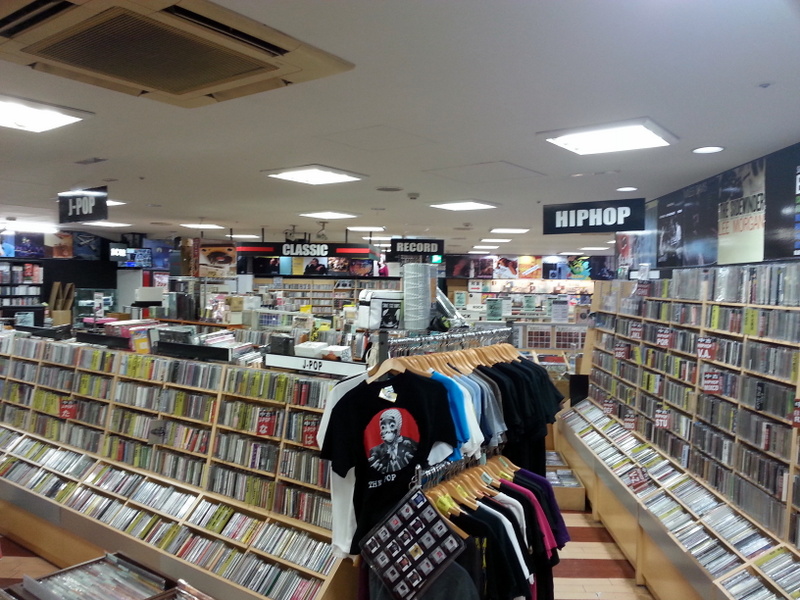
But we’re not going there for this guide, no record stores in that place. Instead, once you emerge from underground look immediately to your left. You should see a building that holds a Disk Union on its fourth floor. As general purpose Disk Union’s go, this one is substantial, with a hefty stock of CDs and LPs of all varieties. Personally, I’ve had good luck there scoring vinyl J-Pop as well as new and used progressive rock CDs. In fact, their prog selection is so deep that I highly recommend it for any and all prog rock fans. They might not have as much as the prog-specific store in Shinjuku, but they frequently have weird and out-of-print CDs that you might not find anywhere else. Worth looking into.
Not far from the Disk Union is a surprise, a vintage gaming store that’s not located in Akihabara or Nakano. It’s the Ikebukuro Super Potato, a spin-off of the world-famous Super Potato that’s located in the heart of Akihabara. It’s not as big as their more famous homebase, only taking up a small space on a single floor, but its usually in far better shape stock-wise than the more well-known store, which is more and more frequently finding its shelves empty due to international tourists buying everything in sight. If you’re interested in game music, be sure to peep in, their selection may be minor, but I usually find something crazy here.
From there, head north. There’s a decent-sized Book-Off with a sizable CD selection if you’re interested, if not, keep going down until you hit another big intersection. Hidden on a side street near that, almost entirely out of view, is Daruma Records. I’m willing to bet that countless record collectors make their way to Tokyo without even knowing this store exists and that’s a damn shame, as it’s one of the best places to buy used vinyl in Japan.
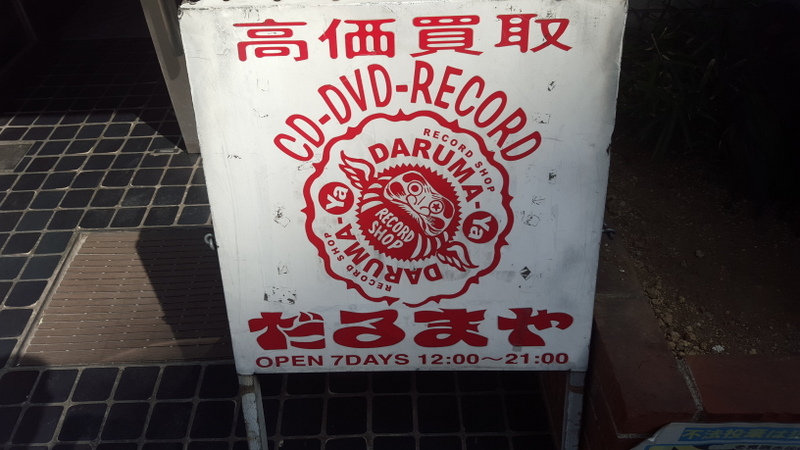
Daruma is kind of a mess at first glance, with boxes stacked by the register and the small selection of CDs rather difficult to look through due to the fact that they line the wall from ceiling to floor, but the place is actually very well maintained. Record categories are clearly defined, with most major rock sub-genres (heavy metal, prog, new wave) and even some minor ones (pub rock) getting their own sections. Neither the records on the wall nor the boxes of records that fill the store are packed too tight either, so you shouldn’t have a problem browsing the stacks quickly.
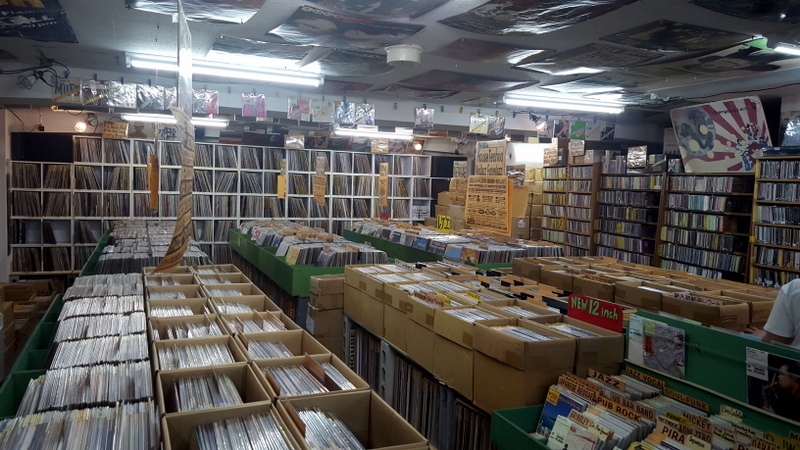
I was utterly amazed at what I uncovered at this store. Out-of-print Yes box sets, rare house music singles, Dave Edmunds promo LPs, rare Japanese metal compilations featuring X Japan, it seemed they had a buried treasure for every genre imaginable. Also, the prices are pretty cheap too. Scoring a mint copy of Atari Teenage Riot’s 60 Second Wipeout complete with the third bonus live LP for less than $30 USD is a score in my book. This place is worth the trip to Ikebukuro alone.
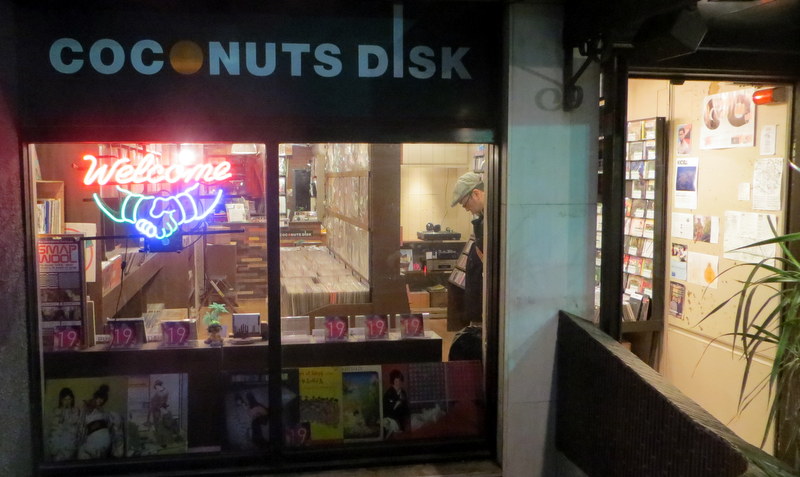
If you’re not hauling too many records at this point and don’t mind a bit of a walk, be sure to check out the local Coconuts Disk, located on the other side of the station, about a a 15 minute walk from Daruma. It’s on the small side, but they pack a lot of vinyl in there, both Japanese and Western, and is worth stopping in if you have the time. Good prices too. And don’t forget to get a point card, it’s good at the other Coconuts Disks, which are all are worth visiting!
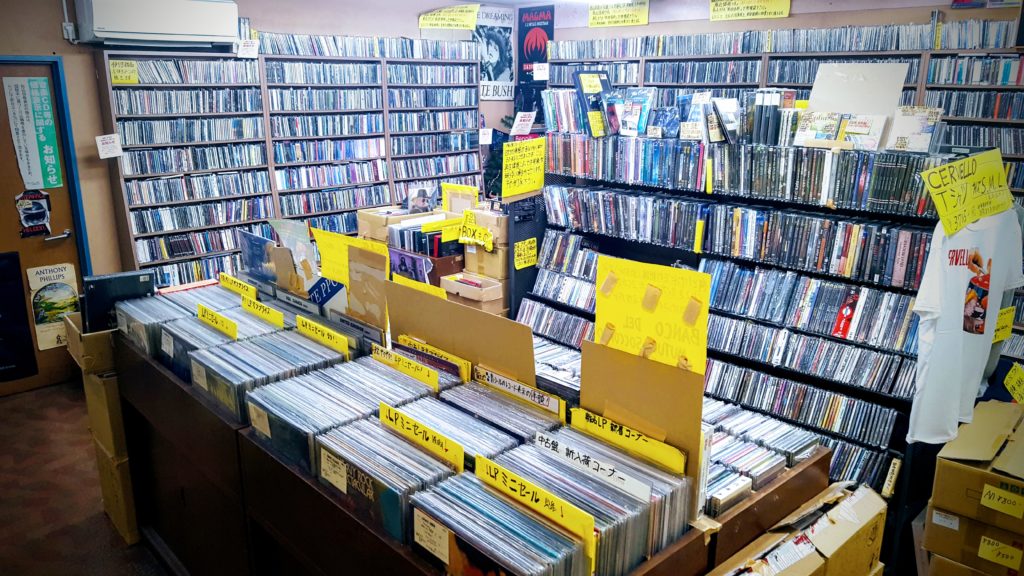
That’s about it for Ikebukuro, but one stop south on the JR Yamanote Line is Mejiro, and if you like prog rock then there’s a store not too far away from that station that you absolutely have to check out. Marquee Records is tiny and tucked away on a side street to ensure the absolute minimal amount of walk-in traffic, but nestled inside its walls is a seemingly endless repository of prog rock from all corners of the globe. Like prog itself, the focus is on European releases, but they have some Japanese stuff as well. While their LP selection is a little scant, their CD inventory runs deep with both new and old releases. And it’s also a fantastic place to find new re-issues of hard-to-find albums. I picked up some Tim Blake, Dark Side Of The Moog, and Clearlight albums here, most of which I have yet to find at other prog-focused stores in Tokyo. So they definitely know what they’re doing here.
Jimbocho
The Jimbocho area is known in Tokyo for its wide variety of bookstores, but buried between the piles of Japanese classical literature and ancient second-hand English language books of dubious quality, there are quite a few great record stores that make the area more than worth the trip, especially if you’re a fan of classical or Japanese music.
Very close to the station is Sasaki Record store, which is impossible to miss thanks to its crazy, vintage video store style sign that adorns the second story.
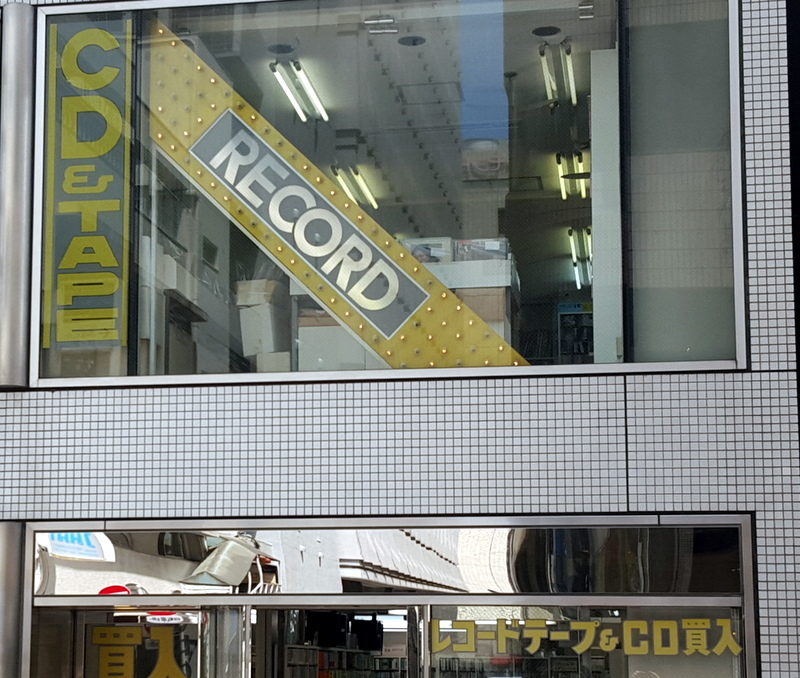
Sadly, the store isn’t as remarkable as its signage, with all of the first floor, and a healthy section of the second, dedicated solely to classical music. What little room they save for pop music isn’t bad, but it is sadly overpriced. Still, if you do fancy yourself a classical fan, I would imagine this store is worth checking out.
Same goes for Fuji Records, which is just a short walk from Sasaki. Nestled atop the ninth floor of a shopping complex, this store is split evenly between classical and more modern music varieties. This is also one of the few stores I’ve seen in Japan that has a healthy collection of 78s, so if you’re feeling adventurous and want to try packing a handful of 78s in a suitcase that will no doubt by rattled to hell and back by airport baggage handlers, go for it.
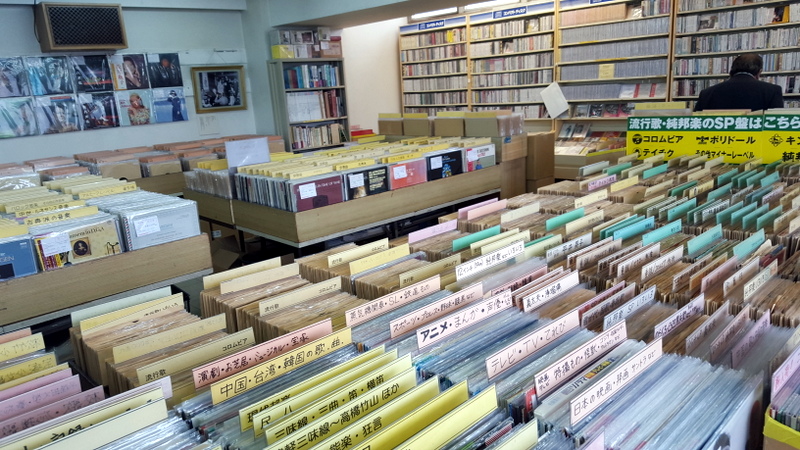
This store is full of crazy surprises though. The back wall is overflowing with 3 inch CD singles, while a surprising number of 45s line the hallway leading from the front, more classically-focused area of the store to the pop section in the rear. Also of note are the rows of soundtrack CDs in the back, all at pretty affordable prices. I was lucky enough to find the Japanese soundtrack to Kill Bill and the long out-of-print CD for Liquid Sky here for less than 2,000 yen total. Great deal.
A bit of a walk, but not too far away from there is Record Sha, another shockingly large store with a very diverse selection of just about everything from jazz to classical, rock to Japanese folk. They are also just overflowing with anime soundtracks that are priced to move. Get your Zillions LPs and get them while you can!
Back on the main street there’s a Disk Union not too far from the station. It’s a standard Disk Union, good and worth going to for sure, but nothing makes it stand out either. Down the street and around the corner from the Disk Union is Janis 2, a used CD store. This store used to be pretty rad, but a recent remodel and relocation across the street has really taken it down a notch. What used to be a decent-sized store filled with a wide variety of titles is now a tiny enclave with a lousy selection. Bummer.
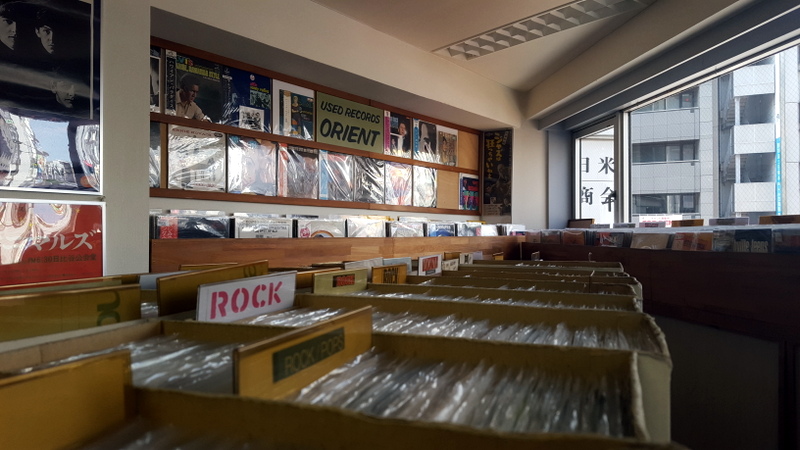
If you’re still up for record shopping and don’t mind a brief walk, you can find a bit more in this area. Between the Jimbocho and Ogawamachi stations lies Orient, a record store that, despite its name, carries Western music almost exclusively. Nearly half of the store is dedicated to 45s from the 60s to the present, no matter what your tastes they probably have something for you if you’re a 45 collector. Their LP selection is a little more focused, skewing towards the 60s and 70s with only a smattering of new wave and alternative stuff. If you’re interests match up with their inventory then you need to come here.
Up north from Orient is the final store in this part of town worth checking out, the local Disk Union, which is located right across the street from the Ochanomizu station. This Disk Union is special, not only because of its size (it’s big) but because of its stock (it’s awesome).
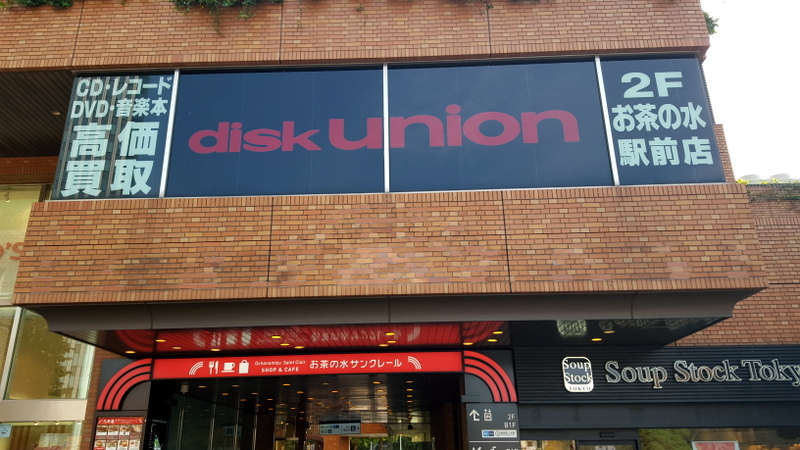
The store is basically split up into three different sections, Western CDs on the right, LPs in the middle, and Japanese music on the left. The LP stock is great, tons of stuff packed in here, with a really big focus on Japanese rock from the 70s and 80s as well as Western new wave music. I bought a mint copy of the Urgh! soundtrack here, and have found rare Bowie, Stranglers, Bauhaus and just about anything else you’d hear on a college rock station circa 1987.
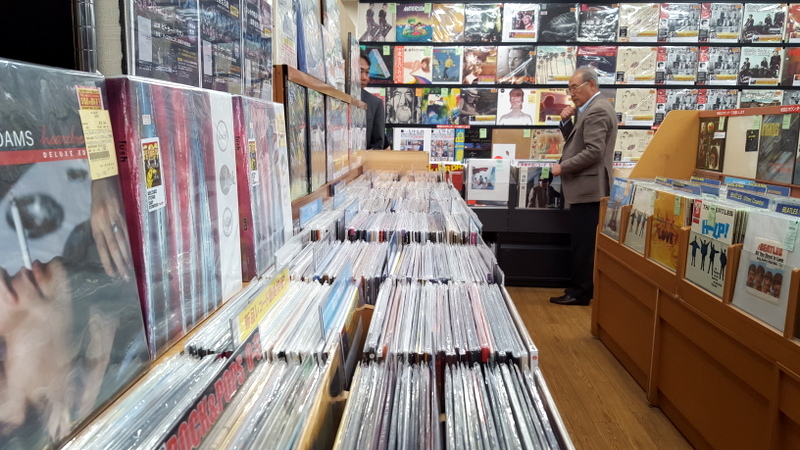
The store’s fascination with the 80s bleeds into the other sections as well. An area not too far from the new release rack seems permanently fixated on the day-glow decade, with a large section constantly dedicated to deluxe re-issues of 80s product both new and old. When I scoured Tokyo looking for the Comsat Angels re-releases last year, this is where I finally found them. Peppered in throughout the legit releases is the occasional high-quality bootleg and semi-legal release too. This is usually a negative for me, but the bootlegs don’t overpower the main stock, and they seem to be well-curated to keep out the complete garbage. Where else are you going to find Duran Duran radio broadcasts anyways?
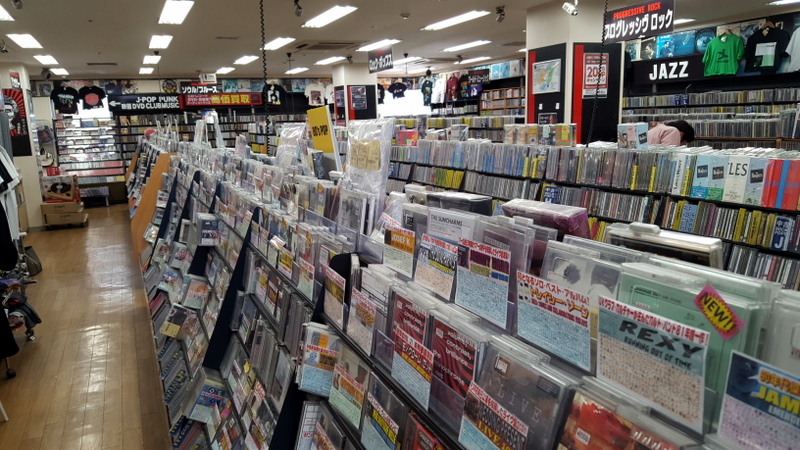
It’s 80s flashback time in the Japanese side of the store too, with re-issues of classic J-pop also getting a prominent display near the register. This place was overflowing with Sheena & The Rokkets releases following her untimely death, and recent I’ve seen a push for Shi-Shonen, Urban Dance and other 80s Japanese synth-pop acts. Never know what you’ll find here.
If you leave this Disk Union and head along the river to the north you’re literally just 10 minutes from Akihabara. Yes, Akihabara is the otaku (geek) mecca of Tokyo, and most of it is dedicated to anime, video games and AKB48, but there is some music to be had there, depending on your personal tastes.
Akihabara
Mainly, those personal tastes should be game and anime music. In fact, if you’re going to Tokyo in hopes of scoring some rare game soundtrack or score from your favorite obscure anime, Akihabara is probably your safest bet.
Nearly every guide to Akihabara that you’ll find on the internet mentions Super Potato, and for good reason. It’s one of the most well-stocked and tourist-friendly gaming stores in Tokyo. And while it’s well-regarded the world over as the greatest (if overpriced) retro gaming store in Japan, it’s also a quality stop for those looking for game soundtracks. Up on the fourth floor they got a whole shelf dedicated to them, with some extra pricey/rare items behind glass in the main display case. While Super Potato is known for being a bit on the pricey side when it comes to games, their game soundtracks are more on the fair side. Just remember that “fairly priced” and affordably priced are not one in the same. Game soundtracks can, and often are, fairly priced at over $100. But if you want that dope Super Mario World soundtrack sometimes you gotta pay.

There’s a Mandarake (a chain that focuses on anime and geek culture) in Akihabara, and on its sixth floor you’ll find their CD section. It’s not huge, but it’s probably the biggest collection of anime music that you’ll find in Tokyo. Their game music selection isn’t as robust, but they usually have some excellent stuff there, and at lower prices than the other stores that carry game music in Akihabara. Be sure to check behind the glass!
From there, head over to the Trader 3. There are several Traders in Akihabara, each with a different focus. This one specializes in retro games, movies and some music. Just like Mandarake, they mainly deal in anime and game music. They don’t have a ton, but their selection is usually pretty solid.
Finally, head down to the very end of the main drag of Akihabara and you’ll find Friends. This is a tiny little retro gaming store, but on the second floor you’ll find a surprising number of vintage game soundtracks. The selection here is crazy, but be warned, their prices are just nuts. This place is the inverse of Super Potato. Cheaper games, ridiculously pricey CDs. If you see something you like be sure to check online or other stores before you buy.
That’s it for the biggest, most easily-accessible record havens in Tokyo. But that’s just the tip of the iceberg overall, let’s take a couple of trips outside the main city, starting to the west.
Part II – The Chuo Line Extravaganza
The Chuo Line is a large railway line that goes from Tokyo all the way out to Nagoya. However, for the purposes of our record buying journey, we’re going to be mainly be focusing on the stops that run along the Chuo Rapid, a commuter line that starts in Shinjuku and goes to Mount Takao, some 30 miles outside the city. Bare in the mind the Rapid has extra-limited service on weekends, so check your train schedules if you’re going to places like Koenji or Nishi-Ogikubo. You might need to grab the local. And be sure to grab a limited express on the way back, you’ll save yourself up to 20 minutes heading into the city.
So let’s hop aboard and head to the first stop on this journey, the home of the nerdiest mall you’ll ever find.
Nakano
Just one stop away from Shinjuku is Nakano, a small but bustling neighborhood known for its large shopping centers and seemingly endless supply of tiny bars and restaurants. It’s an area with character, and while there are quite a few major chains scattered throughout the shopping areas, plenty of independent and locally operated stores remain. It’s kind of the best of both worlds, part big business and part small town market. It’s also developed quite the reputation as the alternate Akihabara as of late, thanks to the otaku goods chain Mandarake taking up most of the Nakano Broadway shopping mall and filling it with stores that specialize in everything from vintage action figures, wrestling paraphernalia and animated pornography. But hidden among the piles of yaoi and mountains of transformer action figures are a few rad record stores, including one of the best specialty stores in Tokyo, so let’s dive into geek paradise to see what we can find.
While most major stations can be confusing as hell and one David Bowie in tight pants away from being a genuine labyrinth, Nakano is pretty easy to navigate. It only has two exits, which makes getting started a snatch. Just head out the North Gate towards the massive covered shopping walkway, but don’t go in there! First thing you’re going to want to do is hook a left and then head down the road perpendicular to the center complex. Stroll down there for a bit and you’ll quickly stumble upon Rare Records, one of two that you’ll come across whilst shopping along the Chuo Line. It’ll be to your right. It’s two stories, but it’s still a small store. The tiny first floor focuses mainly on CDs, while LPs are kept up on the second story. To be honest, I’ve always found their CD selection to be rather minor, focusing mostly on new and old stuff of little interest, from classic rock everyone has by now or mid-grade J-pop that I couldn’t care less about. You’re going to want to head to the second floor. They manage to pack a good selection of vinyl up there, and its all well-organized and easy to look through as well. Nice prices to boot.
After you’re done there head up to the next intersection and take a left. You’ll find yourself in front of a Disk Union with a great selection of vinyl as well as a nice inventory of CDs. Like a lot of the locations outside of Shinjuku, this is a general store that has no declared specialty. However, I would say that this one does tend to feature more high quality hip-hop vinyl than most other stores in the chain. Definitely worth a look no matter what your interests.
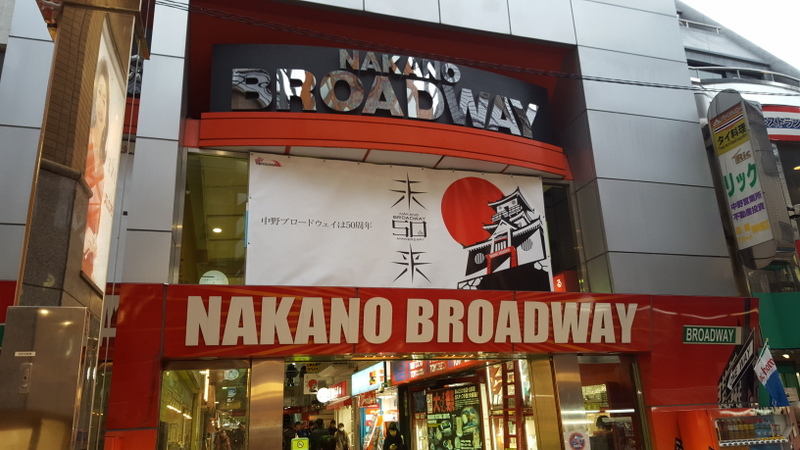
From there head to the main covered walkway you saw earlier. If you’re coming straight from the Disk Union you’ll practically be on top of the Broadway when you get there, it’ll be on your left.
Let’s get one thing straight, Nakano Broadway is huge, strange and utterly confusing if you’re not careful. If you want to scan the whole thing, I recommend starting from the top fourth floor and working your way down if you want to take it all in and do a full afternoon of geek shopping. But if you’re only in it for the music, head straight to the 3rd floor and make your way to the far right corner. There you’ll find Shop Mecano, the only record store I know of in Tokyo that’s dedicated solely to electronic, new wave and synth-pop music both foreign and domestic. If you dig music with keyboards (preferably from the 80s) you will be in absolute heaven. Every time I venture into this store I leave with a lighter wallet and another gem for my collection. Rare and hard-to-find Japanese synthpop; classic game music; early Moog LPs; he has all facets of electronic pop and new wave music that you could possibly imagine. Be sure to check out his Kraftwerk collection, I guarantee you he has something on display that you’ve never even heard of, which makes sense as he wrote the Japanese linear notes for their most recent CD re-issues!
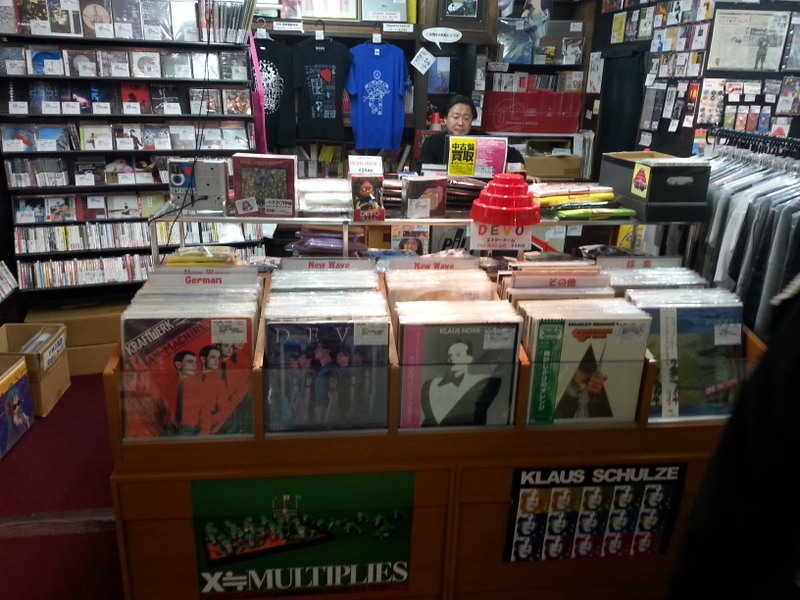
Like I said before, a good portion of Nakano Broadway is taken up by Mandarake, a chain of otaku-themed stores that sell comics, games, figures and just about anything else a nerd might lust after. Most of them are devoid of music, but on the second floor, you’ll find a few that carry CDs, albeit mostly game and anime music, but if either of those genres interest you, be sure to check that place out. The game music here is far cheaper than the game music you’ll come across in Akihabara.
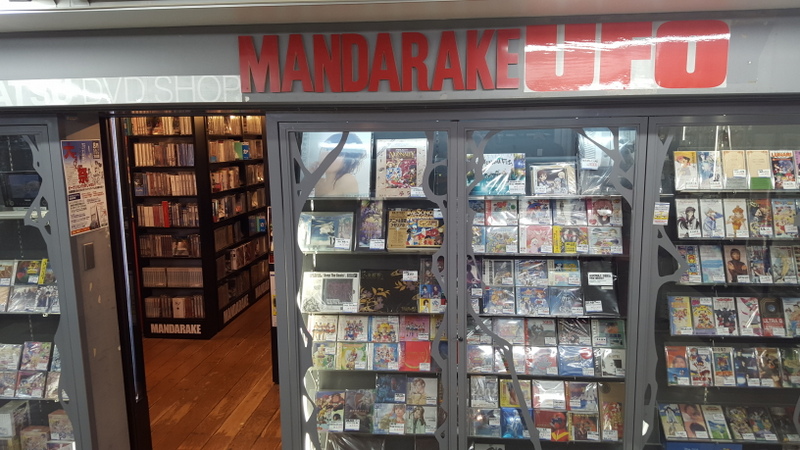
Outside of Nakano Broadway and buried away on a minuscule sidestreet is one of the few record shops I would avoid, a dingy hole in the wall by the name of Flower Record. I’ve seen me some disorganized messes of record stores in the day, but this one is beyond the pale. It is literally nothing more than haphazardly-arranged boxes of records stacked to the ceiling. The place is overflowing with records to such a degree that I can’t imagine more than one customer would fit in there at a time. Now, I’ve read some reviews of this place that swear by it, that the owner has a photographic memory and will immediately know if he has the record you’re looking for and where it is, but I’ll have to take their word for it. To me, it’s nothing more than a terrifying mess and if you’re in there when an earthquake hits, I imagine that would be the end of you.
Koenji
Koenji is dope.
Seriously, it’s probably my favorite neighborhood in Tokyo, and if I ever decide that I’ve had enough of the big city life in Shinjuku I’m probably going to relocate out here. It’s just the most laid back, chill-as-fuck place that you can possibly imagine. Awesome, low-key bars line the streets, accompanied by cute little hip clothing shops that the girls I know all seem to love. For an area that’s so close to the city proper, it has a great vibe of a hidden treasure. It’s the kind of place that Brooklynites or Portlandiers dream their cities could be. A true haven for individuality, good times and cheap beer.
And totally awesome record stores. Seriously, they’re like really good and stuff.
From the station, take a quick walk west, on the northern side of the station, keeping your eyes out for En-Ban Records (円盤) a nuthouse of a store featuring an over-the-top selection of truly oddball material. This place specializes in carrying stuff no one else would even attempt to sell. When I was there I stumbled across a pile of high school jazz band home-recorded flexi-discs; archival sumo broadcasts; and a surprisingly complete selection of Village People 45s. They also carry plenty of new music, focusing largely on Japanese underground indie stuff. So if you’re looking for something you can’t find anywhere else, this should be your number one destination. The place also functions as a bar and live house, so come in late sometime, who knows what crazy act you might catch. The only downside to this place is that it’s really not foreigner-friendly, with nearly everything being in kanji, however the owners are super chill (see a recurring pattern regarding Koenji peeps?) and if you tell them the kind of music you’re into, they’ll gladly recommend something both new and old.
From En-Ban head west a bit more and you’ll discover Godzilla-Ya, the only store on earth dedicated to Godzilla and Godzilla-related merchandise. In case you’re wondering why I’m including it on this guide, well I have two reasons. One, this is a great place to track down some rare Godzilla or kaiju (giant monster) soundtracks, as well as anime and the occasional game music LP. Secondly, it’s a store dedicated to Godzilla! Why the hell wouldn’t you want to go there!
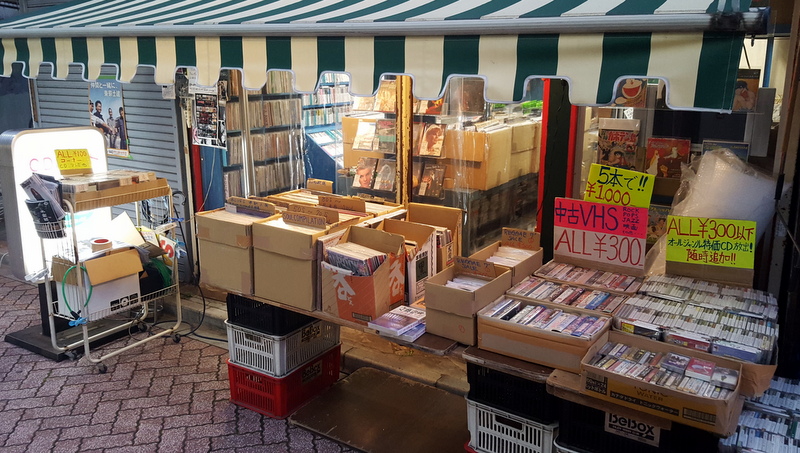
North of the station is mostly homes, bars and restaurants, but there is one nice little shop worth going to, and it’s only about a 10 minute walk from the Godzilla store. The oddly-named European Papa is a delight, and a must visit among the Koenji shops. Again, like most of the stores in Koenji, it’s really small, but it’s filled with tons of oddball stuff you won’t find easily in other places. This includes a wide variety of 80s Japanese pop, hard-to-find oddities by mainstream western acts like David Bowie, and even some weird A/V equipment like guitar pedals and absolutely ancient VHS concert bootlegs. As an added bonus, the prices here can be jaw-droppingly cheap.
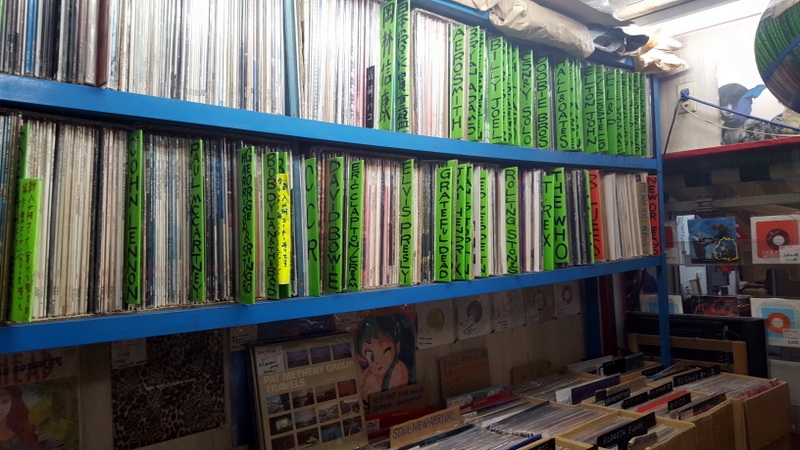
If you’re looking for 45s his pickings are rather slim, but otherwise he manages to cram a hell of a lot into a tiny space. The mess of the place did turn me off a bit at first, but despite it being cluttered, it is still well-organized and easy to browse. The shopkeeper totally has ESP of his inventory so he could help me find what I was searching for with minimal effort. A great little shop.
The final must-visit location in Koenji is EAD Records, down the way a bit, on the other side of the station. It’s even smaller than European Papa, but what it lacks in size and scope, it certainly makes up for in terms of quality. This is a remarkable well-curated collection, primarily focusing on the wildly disparate genres of jazz, European dance music, and disco.
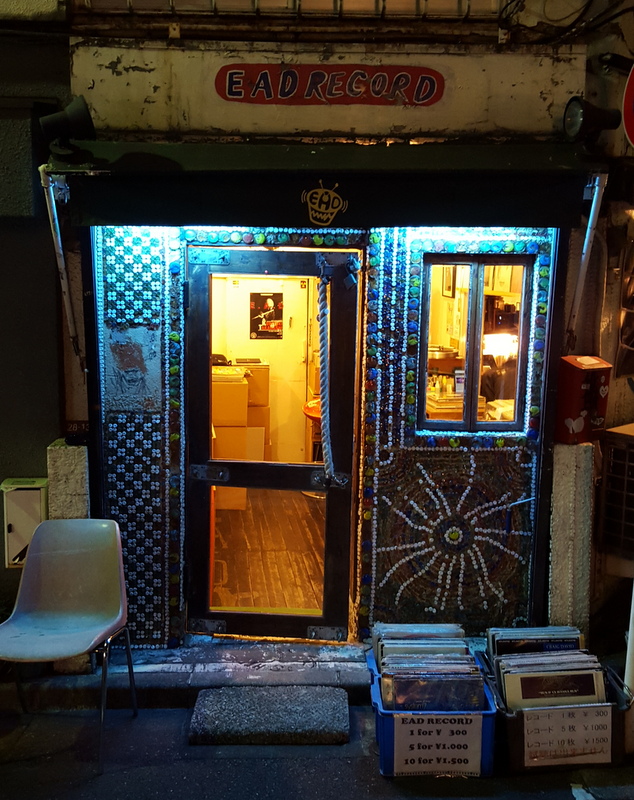
Not surprisingly, the dude in charge is a fan of Goblin.
If none of those genres interest you, obviously this is a pass. But if you do find yourself favoring any of those decidedly niche sub-genres, then holy shit what a store! I’ve been collecting dance music and prog rock for over a decade now, and within minutes of browsing his selection I found records I’ve never seen before (Claudio Simmenti disco 12″ singles!) and records I never thought I’d see in such great condition in person (mint Amon Duul II). The prices are a bit on the high side, but hey, it’s definitely a case of getting what you pay for. Everything here is hard-to-find and usually in damn near perfect condition. Holy shit (did I already say that? Oh well, it’s worth two holy shits). An amazing place.
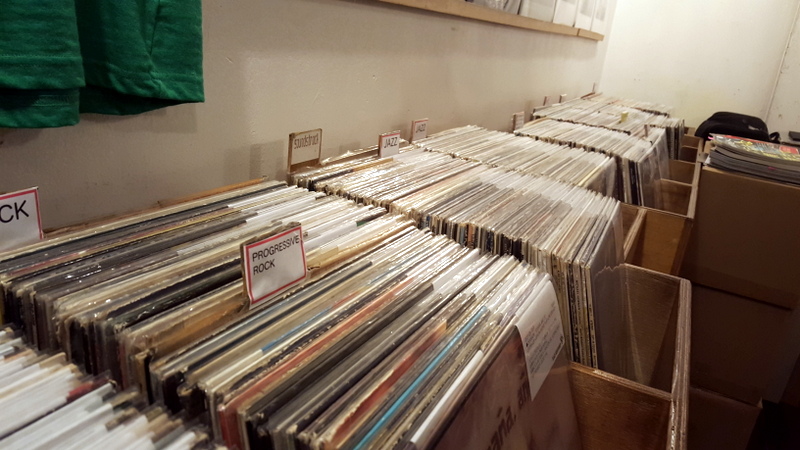
Around the corner is Record Shop Base, a petite store focusing exclusively on hardcore punk. Not my scene, but it looked like it had quite the comprehensive selection, so if that is what you’re into you might want to check it out.
After that, if it’s after six, head over across the street to Light, the best bar in Japan. They got great hot dogs, the bartender is legendary, and they usually have a non-stop soundtrack of funk playing until dawn.
Like I said, Koenji is dope.
Nishi-Ogikubo
You’ll need to take the local train for this one. If you’re rocking the Chuo Express you’ll pass right through this sleepy suburb without even noticing it, and that’s a shame, because there’s a really unique store buried here if you’re lucky enough to find it open.
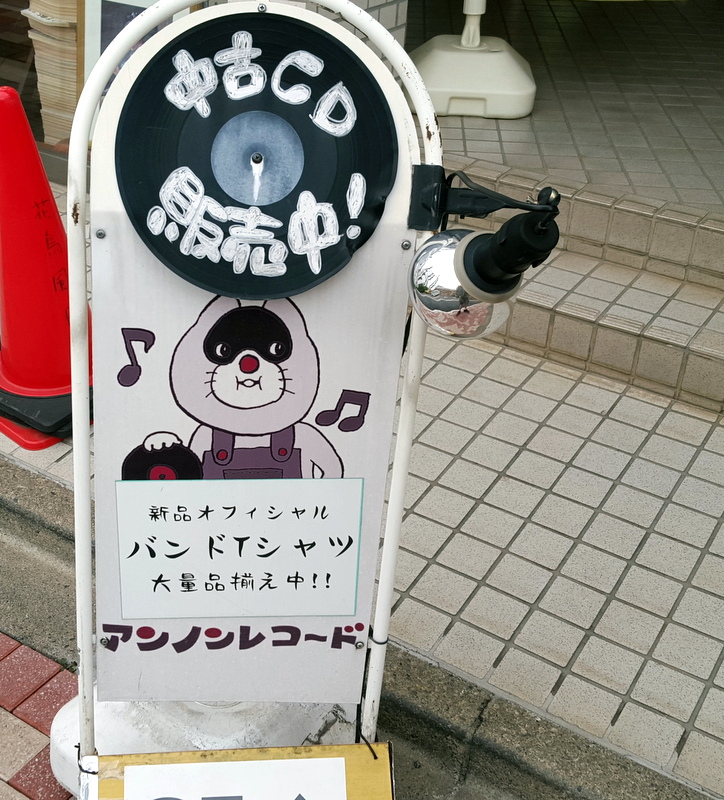
Unknown Records, a small store about 10 minutes away from the station, is a store that lives up to its name. Sure, you’ll find standard stuff here, got me some good Japanese pop and some few great soundtrack CDs (Stone!) but they also have all kinds of wacky shit that I’ve never seen before or since. Strange Japanese mixtapes on cassette, piles of vintage music zines, a seemingly large selection of clothing and apparel (don’t ask me if it’s any good, I’m a giant who does not fit in Japanese clothes), and other odds and ends. The only downside to this store is that it seems to be closed a lot. So I would call and make sure someone picks up the phone before getting off that train.
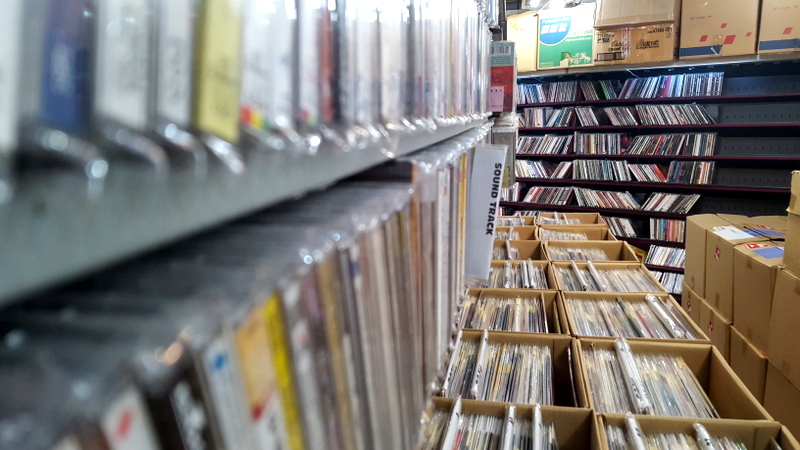
There are a few other record stores in this area, but they’re quite bad, some of the worst I’ve seen in the greater Tokyo area actually, so steer clear.
Kichijoji
Apparently some time ago Kichijoji was the Brooklyn of the greater Tokyo, hip and indie. Now it’s pretty gentrified, with major department shops and camera stores abound. As such, it’s a pretty random place. On one street you might find a bunch of nice little boutiques, bars and restaurants, and on the next you might see a McDonald’s nestled between outlet clothing stores. So there’s definitely something for everyone, but navigating the place can be a real nightmare. Google Maps. It’s your friend.
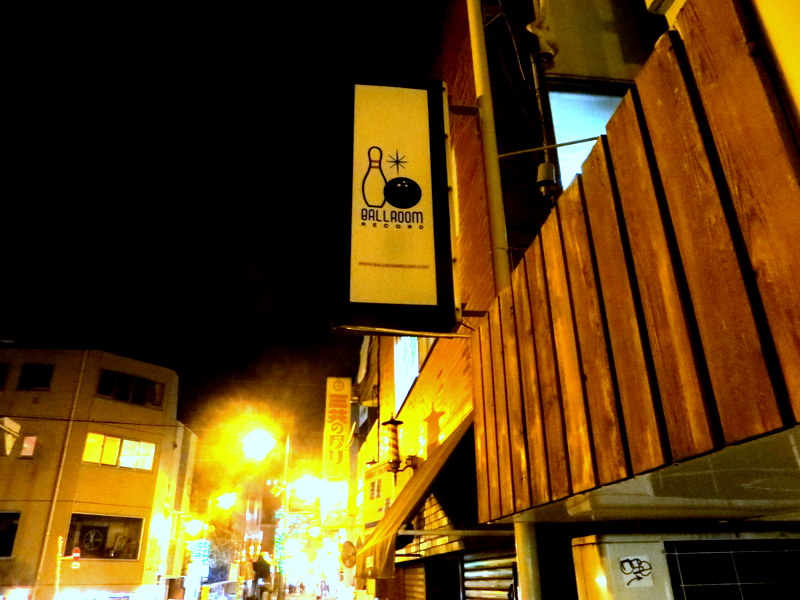
Kichijoji has several great stores, but to me, the best of the bunch is Ballroom Records, a vinyl-exclusive store located not far to the east of the station. Right from the get-go, you can tell the store has a groovy vibe. The bowling pin door handles give the place a retro feel, and the vintage kitsch adorning the walls make it feel like you’ve wandered into the world’s greatest lounge party. This is what I imagine Grand Royale’s headquarters must’ve looked like.
While the store’s decor is decidedly channeling the 50s and 60s, the music it houses shows no such limitations. Genres and sub-genres of all types, from J-pop and classic rock, to krautrock and old-school hip-hop all share shelf space. And it’s all good too. One problem with a lot of the bigger record stores in Tokyo is that they don’t curate their collections, they sell damn near anything. It feels like Ballroom actually goes through the effort of turning records down, or at least burying them on the floor so I don’t have to shuffle through 20 Styx albums when I’m trying to hunt down some good classic rock.
One recent downside to Ballroom though, is that their hours have decidedly taken a turn for the worse. They’re only open from 4:00pm to 7:00pm! I assume they’re shifting focus from retail to online, but such limited hours is just idiotic.

Head out of Ballroom and hang a right. Down the street a bit is the second Rare Records you’ll find on your Chuo Line tour. This one is better than the Nakano location, being not as cramped as that tiny little store, but it lacks the scope of the (now sadly gone) Koenji store. Still, worth a look, their collections of J-pop and soundtracks are top notch. Also, when I was here on vacation a few years back and lost my credit card at the nearby Studio Ghibli Museum, the clerk from the store called them to see if they could track it down! So they get cool points for that.
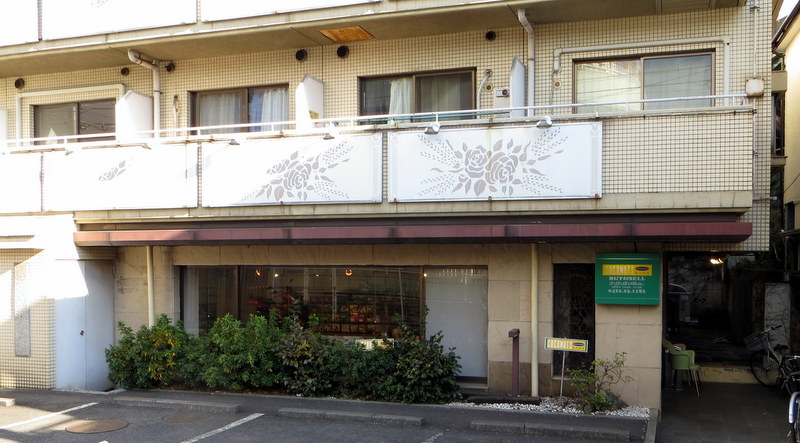
Not too far west from Rare is my absolute favorite store in Tokyo, the local Coconuts Disk. Don’t get me wrong, Ballroom is an objectively better store than Coconuts, it carries more records and has a better look, but this store has a strong sentimental value for me, as it was the store where my all-time favorite movie, Fish Story, was filmed. If you haven’t seen that movie, I highly recommend seeking out a copy (just avoid the horrible American DVD, it’s cropped and has burnt-in subtitles), its the greatest movie ever made about the power of music to change the world.
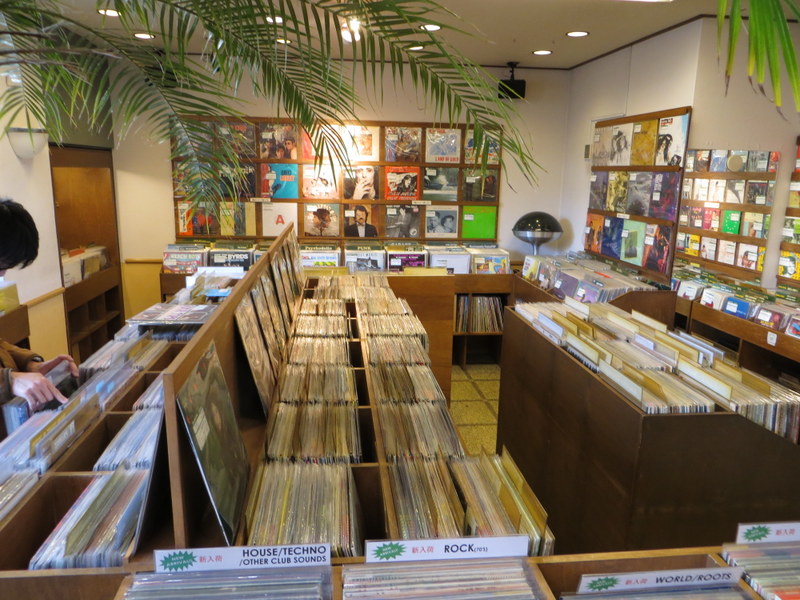
Anyways, got side-tracked there for a bit. Coconuts Disk! This is a good store! They’re always getting new records (be sure to check the new arrivals section first, always good shit there) and the records themselves are well-divided into incredibly specific sub-genres, with everything also being split down the lines of “Japanese” and “everything else,” even the soundtracks.

Their vinyl selection is rad, but be sure to skim their CD selection too, as the stuff there is priced to move. I found a ton of out-of-print Prince my last time there and spent $40 for albums that would have run me well over $100 online. This is common theme across all of the Coconuts Disk stores in Tokyo, I might add. Their records tend to run on the cheap side.
Nearby Coconuts is Fineday Records, it’s open for only a few hours a day, is seriously lacking in quality records and is cramped and hard to maneuver in. Another example of the food is terrible and in such small portions. Skip it.
However, one store you should not skip is the local Disk Union located on the north side of the station. It rivals the Nakano location in size, but features a much more eclectic selection of music, including an in-depth soul/r&b vinyl section, and a dedicated prog CD shelf that’s small in scope but makes the most of its limited space to only feature the true highlights. Probably my only complaint with this one is that the vinyl is packed in way too tight in some sections, but that just means they have more records so I guess that’s not all that much to complain about. If you’re already in the area you need to check out this place too.
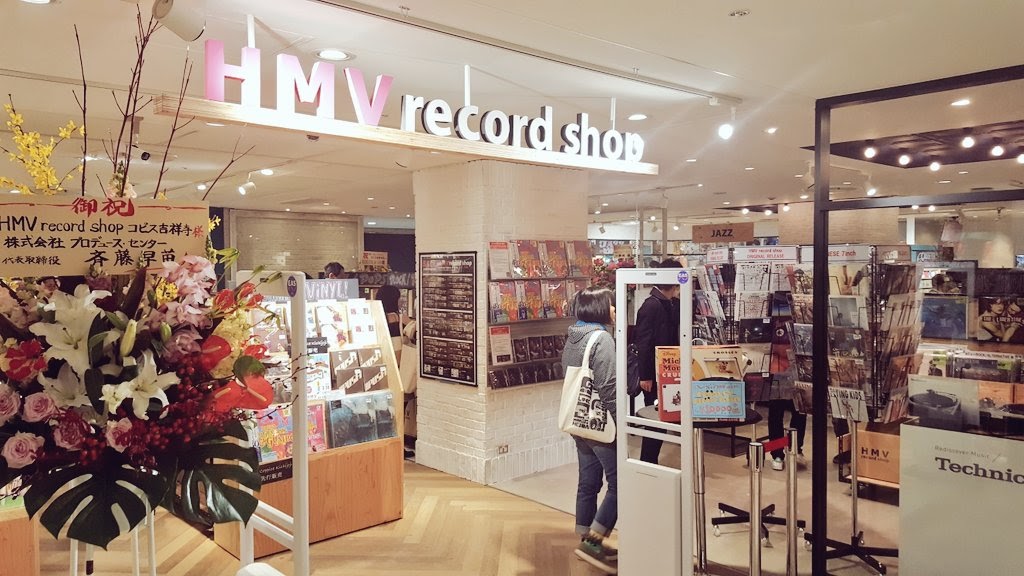
Just across the street from the Disk Union is one of the biggest record stores in Kichijoji, although you might miss it from the street. Head into the Coppice shopping mall and make your way to the second floor. There you’ll find the latest HMV Records to make its way to Tokyo. It’s not as impressive as its Shinjuku or Shibuya counterparts, but its a nice store nonetheless. It has less in the way of soundtracks or 80s music than the other locations, but it does have a much bigger and more diverse CD selection than the Shinjuku location. Also, its prog rock stock puts what the Shibuya store has to shame.
Mitaka
Just one stop removed from Kichijoji is Mitaka, a quaint little area known mostly for being the home of the Studio Ghibli Museum, a tourist stop I absolutely recommend checking out (however be sure to buy tickets well in advance). It’s also the location of an out-of-the-way, but fantastic, little record store by the name of Parade Records.
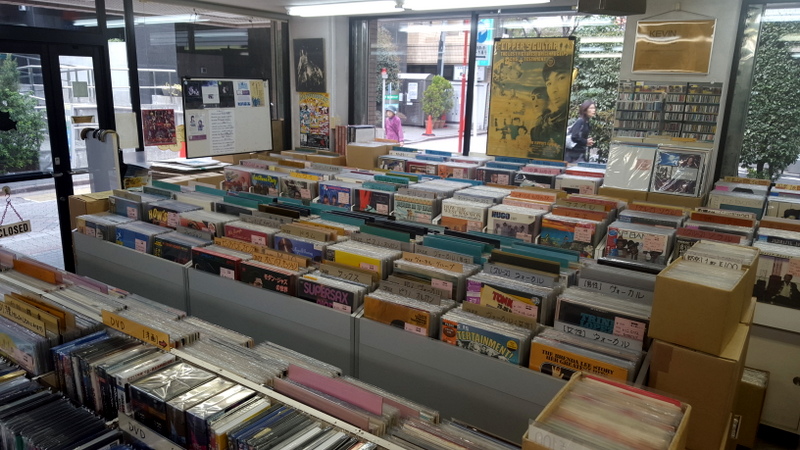
This is your classic mom and pop store, so while it lacks the custom curation and stylish decor of the flashy Kichijoji stores, it more than makes up for it thanks to its varied inventory and low prices. Judging from the posters that adorn the walls, including an amazing vintage Genesis tour ad slick, I suspect this store has been around since the 80s, if not earlier, and it shows with its stock of rock and j-pop from the 70s and 80s. I was particularly impressed with their CD selection. While it is relatively modest when compared to Disk Unions and other big chain shops, they carry a lot of unique stuff and even manage to present it in interesting ways. For example, they carry a lot of custom ‘box sets,” collections designed to feature an artist’s entire discography at a budget price. Great way for someone to pick up an instant record collection on the cheap. My boyfriend was equally enamored with their classical CD section, and that’s something I’d take his word on.
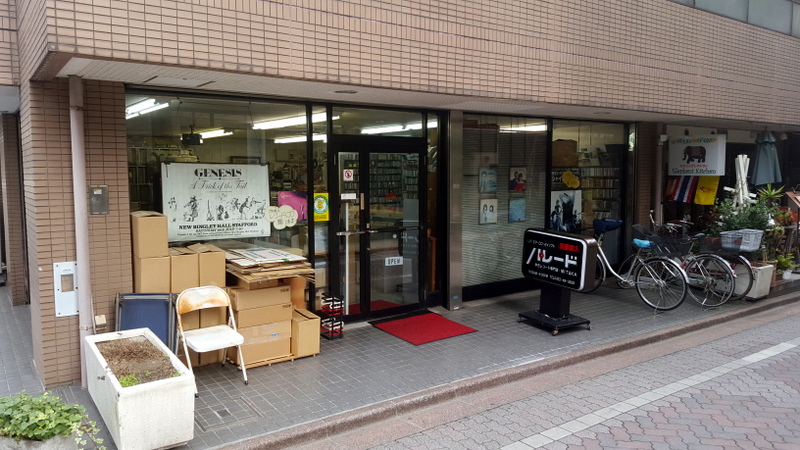
Is this store essential? Probably not, but if you’re already going to make the Chuo Line trip, then you might as well swing on by. If you’re short on time and looking for some stuff a bit more unique though, maybe slide on down to the next few stops.
Kokubunji
There’s not much to Kokubunji.
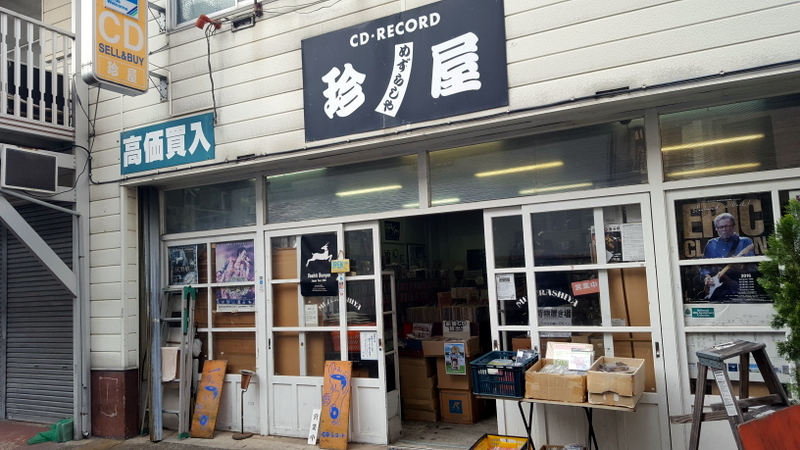
There are only two small stores at this out-of-the-way station, both part of the same chain which goes by the name Mezurashiya (store 1, store 2). Going this far out of your way just for them would probably be a mistake, but if you’re already at Mitaka, and you plan on visiting the good stores at the stop after Kokobunji, then why the hell not?
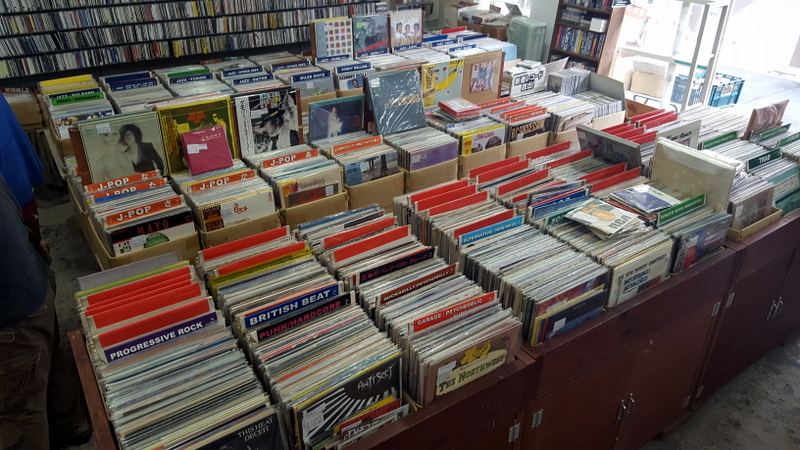
Neither of the Mezurashiya stores in Kokobunji specialize in anything in particular, but they both tend to attract odd assortments of records. Both times I’ve visited this pair of stores, I’ve walked away with something unique, be it a rare soundtrack on vinyl, a cool vintage Japanese rock LP or a compilation of Godzilla theme remixes (that was a good day). Their prices are quite reasonable too. You’re not going to get away with a steal here, they usually know what they have, but they price fairly, and much cheaper than any store you’d find closer to the city.
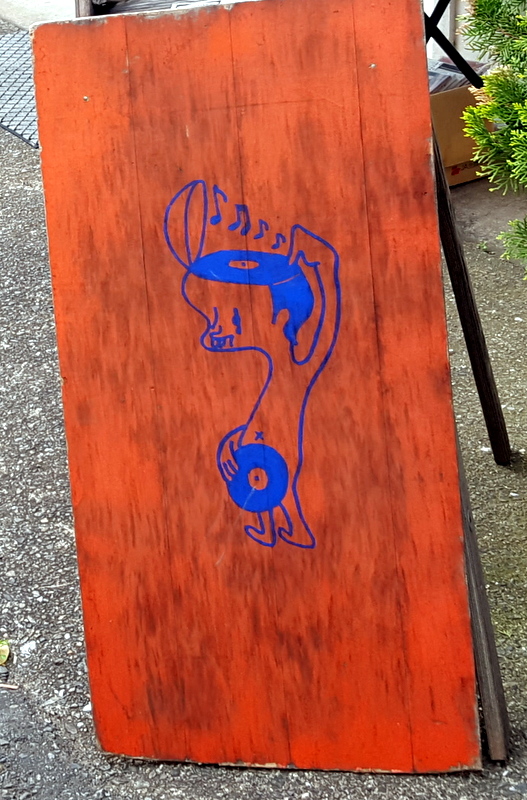
Plus that sign.
Tachikawa
This is as far out as I recommend going on the Chuo Line if you’re looking for records. There are some stores past this point, but trust me when I say that none of them are worth the effort nor time.
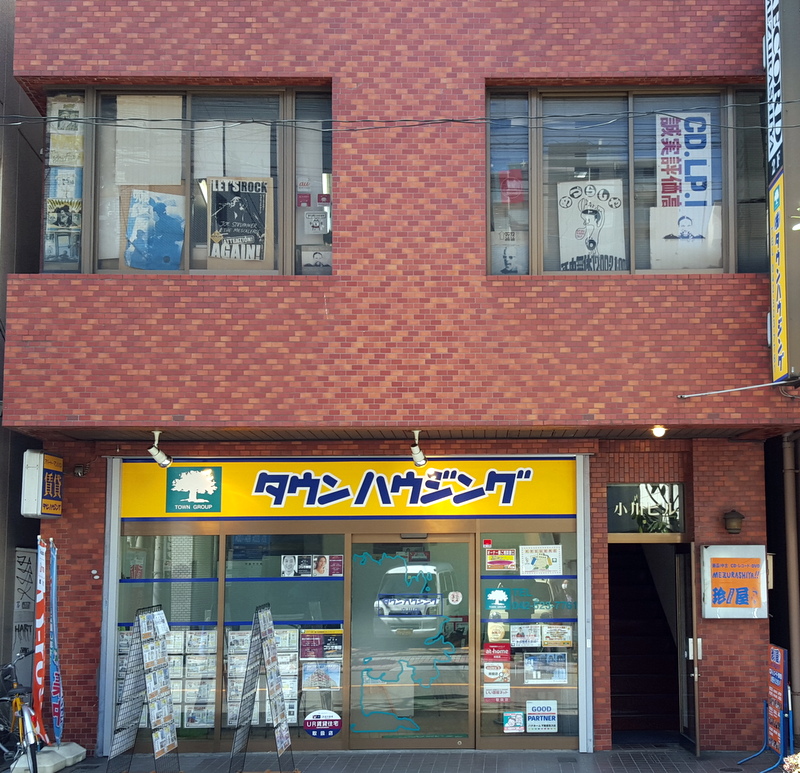
But the shops in Tachikawa, while a good hour away from the city itself, they can be worthwhile, especially if you’re looking for electronic or dance music. That’s because Tachikawa is home to two more Mezurashiya stores, about a block apart from each other, with one heavily focusing on dance music on vinyl. This store is absolutely stacked with 12″ dance singles, 90s house music like you would not believe. It also has a good selection of jazz on vinyl. Get your Black Box/Miles Davis mash-up material going I guess. The other Mezurashiya down the street is quality as well, although it’s a bit more broad with its inventory. I was impressed with the stock of 80s Japanese rock music that they had during my visit.
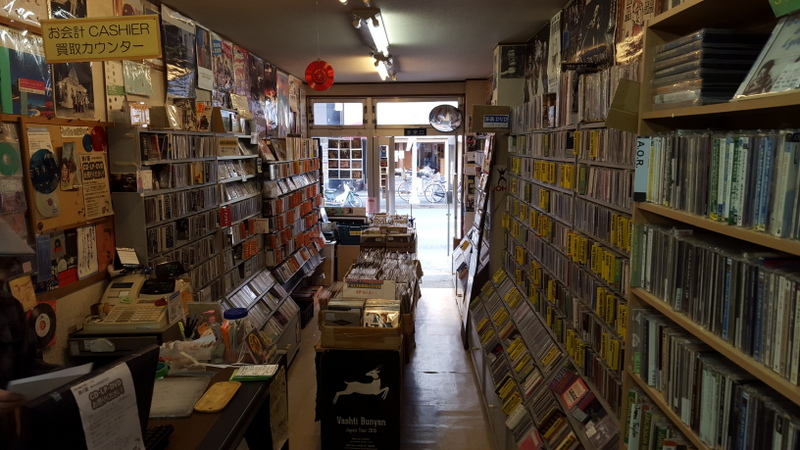
Aside from the Mezurashiya’s there’s a quality Disk Union not too far from the station that’s worth the visit if you’re already there, as well as a gigantic Book-Off Bazaar that has a substantial selection of CDs, movies and games, as well as figures and other anime-related paraphernalia if that’s your thing.
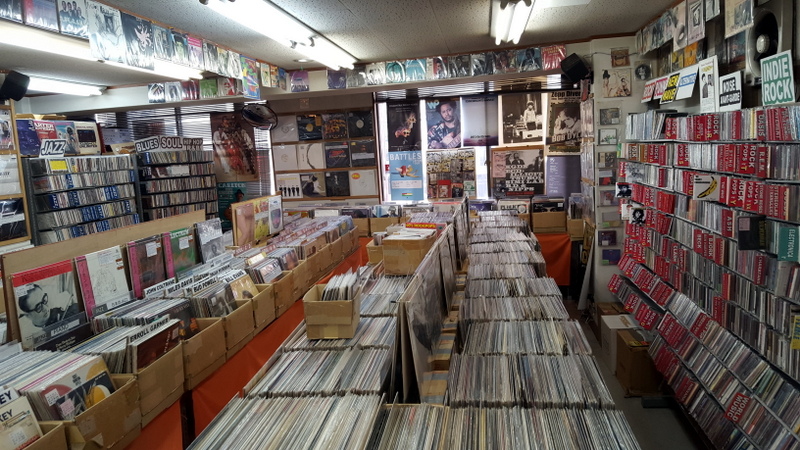
That’s it for the Chuo line. Remember, take the limited express on your way back to save yourself an excessively long train trip!
Part III – South by Southwest
While nothing can compare to the majesty of the Chuo Line, a trip southwest along the Odakyu Line can unearth some real buried treasures, assuming you don’t mind an hour long train trip, followed by another 40+ minute trip that will find you going to the middle of nowhere, via bus.
Okay, that last part might not be for everyone, but the first half is worth it, trust me.
Shimokitazawa
Shimokitazawa (or Shimokita for short) is well known internationally in some circles for being a hipster haven full of fantastic restaurants, amazing bars, trendy fashion boutiques and, yes, amazing record stores. It’s easy to get to, just hop on the Odakyu line at Shinjuku Station. If you catch the Limited Express it’s just two stops.
While it’s easy to get to and a lot of people seem to dig it, I don’t always think it’s worth the trip. Okay, honestly I can’t speak all that much on the fashion boutiques (not many cater to giant white men) but in terms of record shopping, Shimokita is kind of a bust.
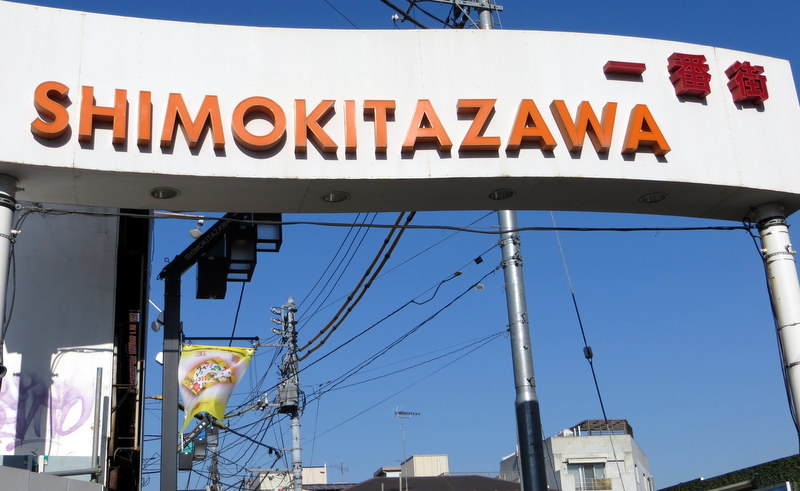
First of all, as a trendy place, store turnover is a real problem here. At least two stores that I used to frequent here no longer exist, and in doing the research for this guide I came across a third that was in the process of closing. I suspect that with its growing status as a trendy young shopping area, the rent here is going up and forcing more of the niche places out.
Secondly, most of the stores that remain just aren’t that good, with overpriced records and spotty hours (more than once I visited Shimokita to explore new stores only to find them closed during their advertised hours). I suspect that many of the people who run stores partake too strongly in the area’s prolific nightlife culture and can’t be bothered to open their stores on time. Fine by me, I’ll give my money to other places.
With those rather major caveats out of the way, there are a few record stores in Shimokita worth checking out, depending on your music tastes, and Shimokita is on the way to a much better place to go crate digging, so you might as well swing by a few of these stand out places along the way.
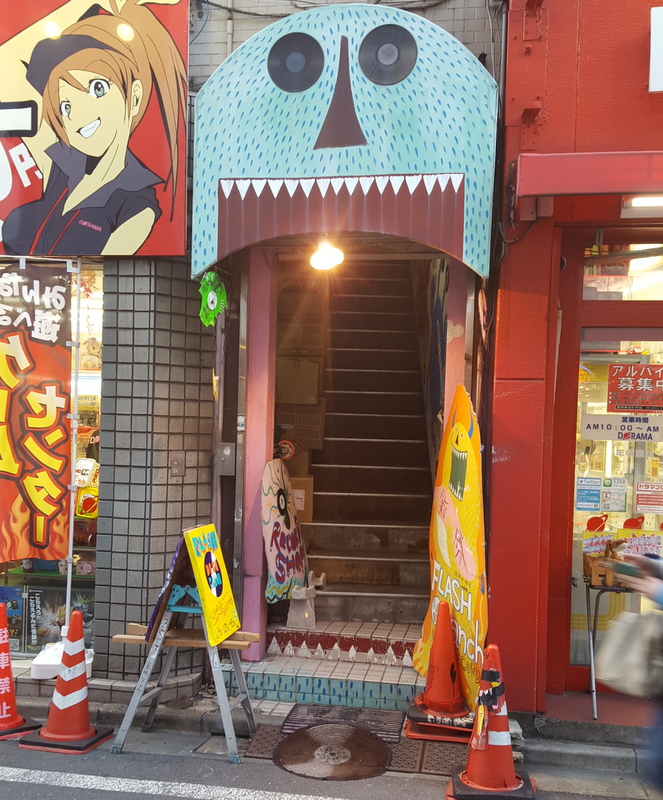
Perched atop a game center is Flash Ranch Records, a rather oddball smorgasbord of import records from the UK and America. If you’re in the hunt for Western rock, new wave, and hip-hop, you need to come here, they got loads and most of it is cheap. The store is on the messy side and reminds me of the kind of run-down record store you’ll find in America that’s been run by the same dude since 1978 and hasn’t been properly dusted since the first Bush was in office, but that’s kind of its charm. It’s a mess, but it’s still relatively well-organized, and the cardboard boxes that constitute as record shelves aren’t overpacked, allowing for quick and easy searching. There’s a lot of junk here, expect to come across countless numbers of worthless classic rock LPs and forgotten rap albums, but there’s also plenty to enjoy. Their 12″ single selection alone is worth the trip if you like 90s club tracks.
Smaller in scope and harder to find, but also well worth the visit is City Country City, a cute little record shop that doubles as a cafe. They don’t have much, but they take care of their collection, showcasing rare and hard-to-find 12″ dance singles, reggae, techno and Japanese music from the 70s and 80s. Their focus is certainly on dance music, but if you’ve already made the trip to this part of town, I recommend stopping in even if your tastes slide more towards rock or indie. They have a nice selection of those genres as well, and at great prices. Besides, the ambiance of the place is hella chill and worth a stop in regardless.
The last of the essential stops in Shimokita is Jet Set, an ultra-hip and stylish record store with a totally groovy 70s airlines atheistic. Like most of the choice stores in Shimokita, this one is focused on dance music, but they also carry indie rock and other stuff that’s a bit left-of-the-dial. Most of what they carry is new, but they do have a small used section, and this is why I recommend everyone check out this store if they happened to find themselves nearby. Their used section has an “anything goes” flavor, and I’m always shocked at what turns up in there, often a lot of great, incredibly rare 90s rock priced way too cheap. Looking for that rare Smashing Pumpkins LP? You might hit gold here.
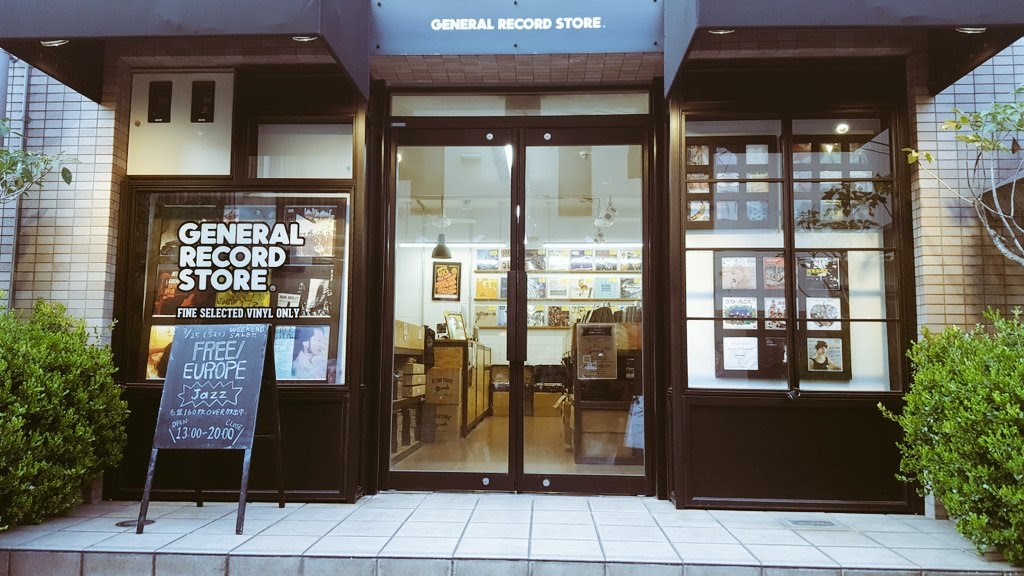
Just around the corner from Jet Set is General Record Store, a very unassuming little boutique that houses a remarkably diverse selection of vinyl from a variety of genres. They have a hefty stock of high-quality 45s, and a good mix of music from all genres. I was very impressed with their prog rock stacks (I’ve never seen so much Hawkwind in all my life. The only stuff they carry on CD is jazz though, so if you’re looking for rock or pop stuff on CD, this won’t be the place for you. Also, they have consistent (if horrible) hours. 1:00-8:00 every day.
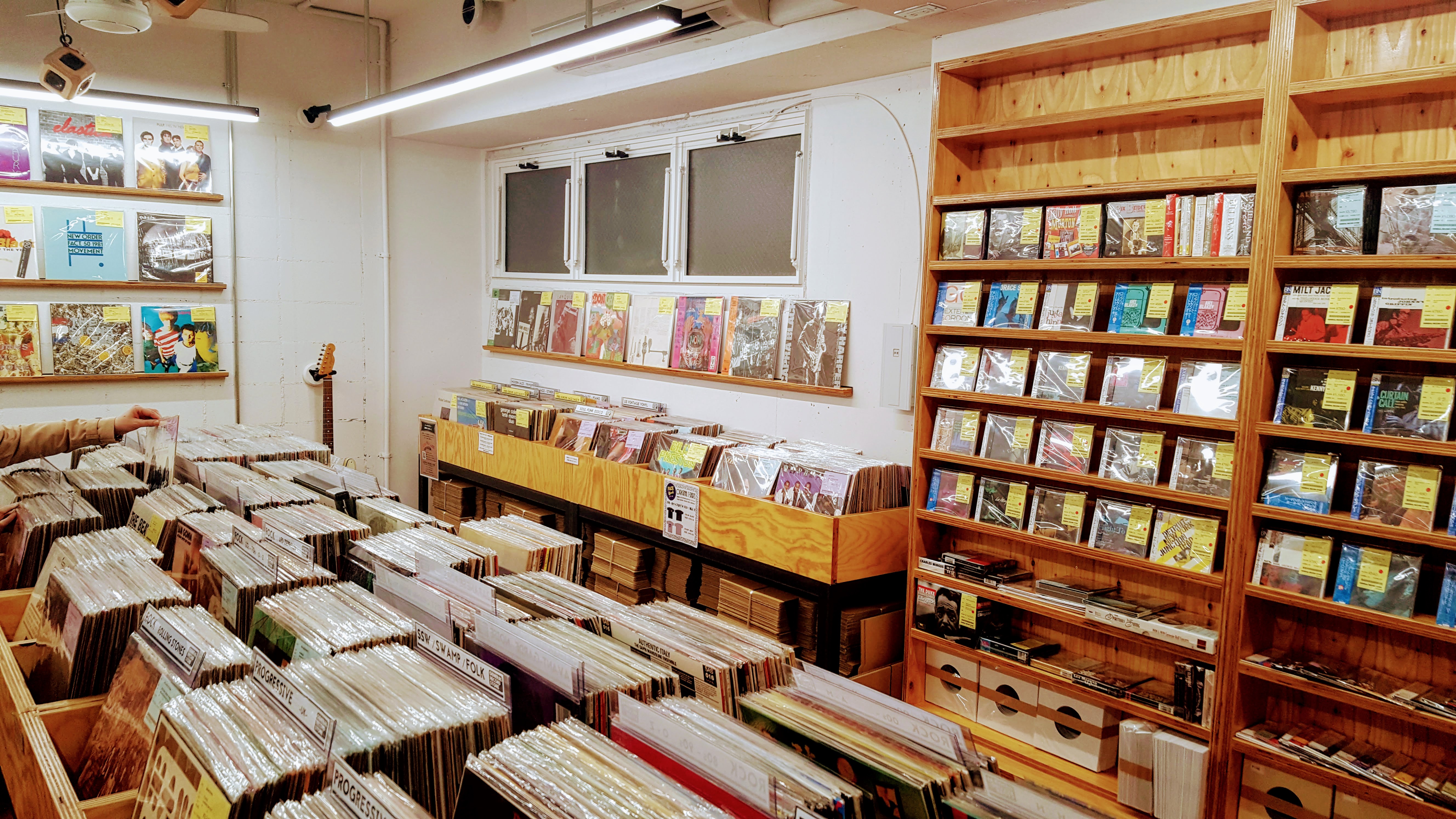
There’s also a Disk Union nearby, and it’s good, but again, it’s focus is club music so if that’s not your thing then…that’s not your thing. It has a hefty vinyl section, but nothing about it stands out when compared to other all-purpose stores in the chain. So again, if you’re already in the area slide on by, otherwise, skip.
As for the other stores in Shimokita, hey knock yourself out, but don’t get your hopes up for them to offer anything at fair prices or even, y’know, be open.
Machida/Aoba
Shimokita is for suckers. The real hardcore out there know that if you want to track down the illest shit, then you have to go Machida, the secret hippest place in the greater Tokyo area.
Okay. That’s not really true. To be honest, Machida is really just a medium-sized suburb, located to the southeast of the city proper. It’s really not known for much of anything actually. It has a nice Museum of Graphic Art, and an amazing little park, but neither of those places are racking in the tourists. And, quite frankly, there aren’t even that many stores in the general area, just three that are really worth scoping out.
However, they are incredible.
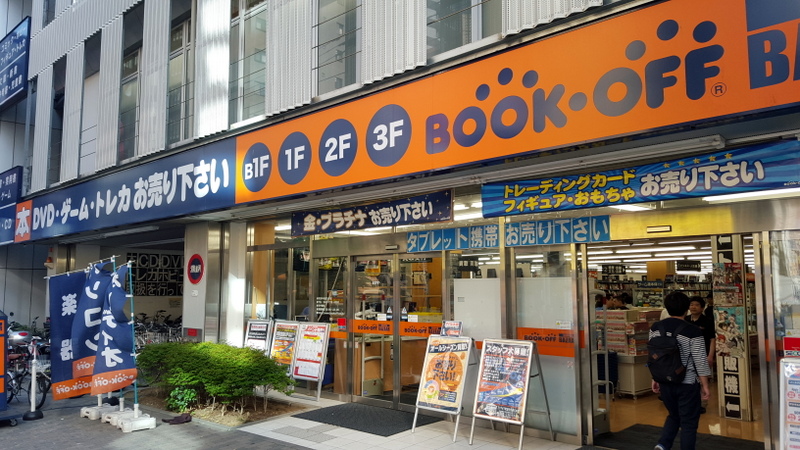
First of all, if you’re into CDs, then there’s an utterly massive Book-Off, quite possibly one of the biggest I’ve seen in Tokyo, not too far away from the station. The basement is nothing but music and CDs, and its the size of a large-scale American supermarket. They really pack in the rarities here, both from Japan and back West, and their game music selection is one of the best I’ve seen.
More recently they’ve even begun stocking vinyl en masse, a rarity for this largely CD-only chain. I’ll be honest, their vinyl selection isn’t all that hot, but the prices are right and I have found some quality stuff buried there. Just last month I scored some awesome Def Leppard 12″ singles. So give that section a browse, you never know.
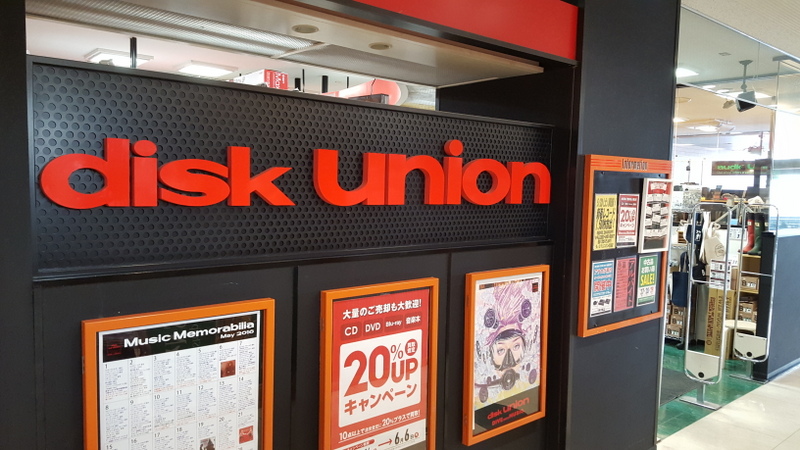
A bit further down the road from the Book-Off is a Disk Union. It’s not as surprisingly huge as the Book-Off, but it’s bigger than the average Tokyo location and has a good selection of CDs and LPs, with a better-than-average variety of prog rock it seems, and club music for some reason. Also, unlike some other out-of-the-way Disk Unions with a huge vinyl stock, the records aren’t overpacked or difficult to shift through. And just like that Book-Off, I frequently find some rarer stuff out here than I would at the central Tokyo locations, that’s the perk of going out of the way.
But do you want to go really out of the way and find the really cool shit?
Okay, here’s what you do. First, go back on the Odakyu line towards Shinjuku and hop off at Kaiko station.
Yeah, you’re in the middle of nowhere, it’s cool don’t worry.
There’s a bus stop not far from the station. Go there and hop on the 21 こどもの国行. (That’s the sign you’re looking for.)
Hang tight on that bus for about 15 minutes or so (and possibly engage in witty banter with racist pensioners who will stare at you) and get off at 中谷都. There, you will see a mini-mall. On the far right of that mall is Kamoshidacho, the most amazing, hidden, out-of-the-way shop you’ll have the incredible pleasure of stumbling upon, stocked to the brim with an incredible selection of records at prices that can at times be an absolute steal.
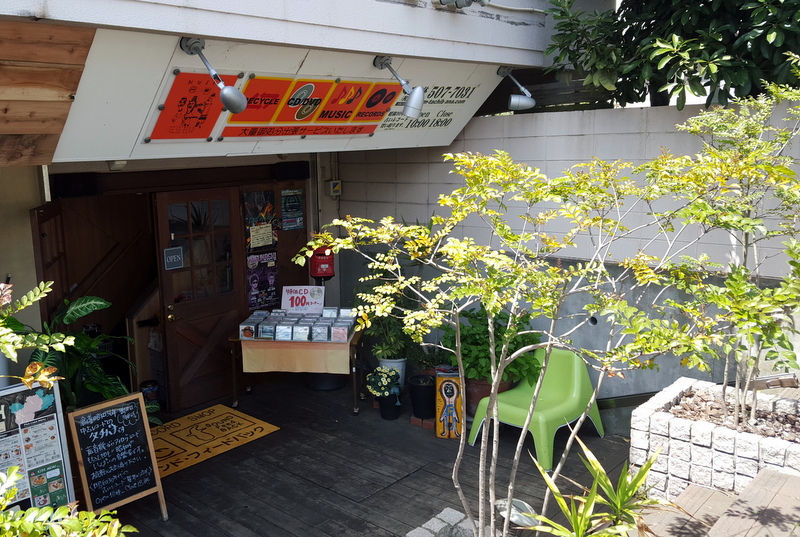
Upon first walking into the store you’re greeting by a large selection of jazz and classical, but don’t let that deter you. Head towards the back wall and that’s where you’ll find the real treasures of this store; rows upon rows of every type of record you can imagine, both from Japan and elsewhere. In just five minutes of browsing there I found some obscure Japanese electronic records, more Yes albums than I could dream of, and strange oddball releases like Greg Hawkes’ solo album (he was the keyboardist from The Cars, and his solo record is amazing FYI).
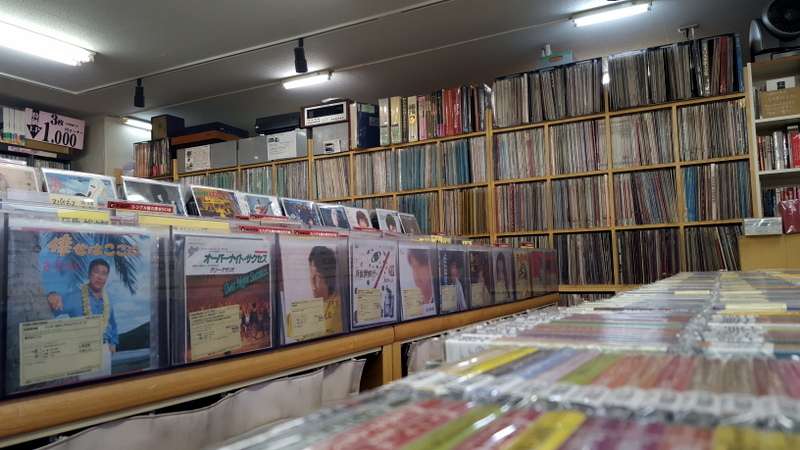
The store also has a huge catalog of 45s and CDs, and even some tapes hidden in back. There’s some good hardware here as well, although I suppose lugging it out of the store might be a bit of a struggle and since the owner doesn’t speak a lick of English, don’t bother trying to arrange a delivery for anything you might fancy.
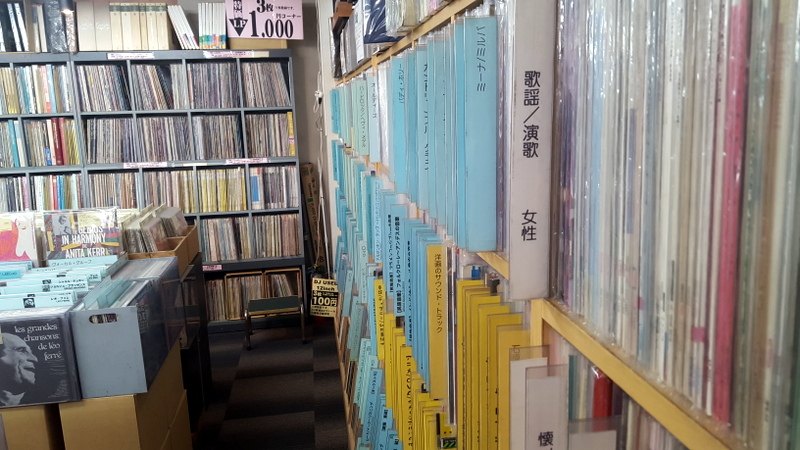
At this point you’re actually technically in Yokohama, so you might be tempted to head over there to see what they have to offer. However, there’s no easy route from Aoba to Yokohama, and if you’ve started your day at Shimokita, made the trek to Machida and then the journey all the way out to Aoba, it’s probably pretty late. Head back to the city via the Odakyu line and continue on tomorrow.
Part IV – It’s (Not Really) Grim Up North
Let’s escape the hustle and bustle of Tokyo for…the hustle and bustle of Saitama, a large suburb-like area to the north of Tokyo that’s home to about the Saitama Super Arena, approximately one billion golf courses and a small selection of wonderful record shops. Not only that, thanks to the large number of commuters who travel to and fro the suburb everyday, it’s very easy and convenient to get to from Shinjuku station. The first stop on our tour is just a 20 minute trip.
Kawaguchi
Our journey in Saitama begins at Kawaguchi, located just across the Arakawa river. There’s no direct way to get here from Shinjuku, but like I said the trip is brief and easy. From Shinjuku you’ll want to take the Shonen-Shinjuku or Saikyo line (depending on the time of day) and then transfer to the Keihintohoku line at Akabane station. It’s super easy.
(If you’re an idiot like me you could also decide to randomly walk there from Shinjuku one afternoon, but that’ll take you about three and a half hours and includes a decent uphill section, so seriously, don’t do that.)
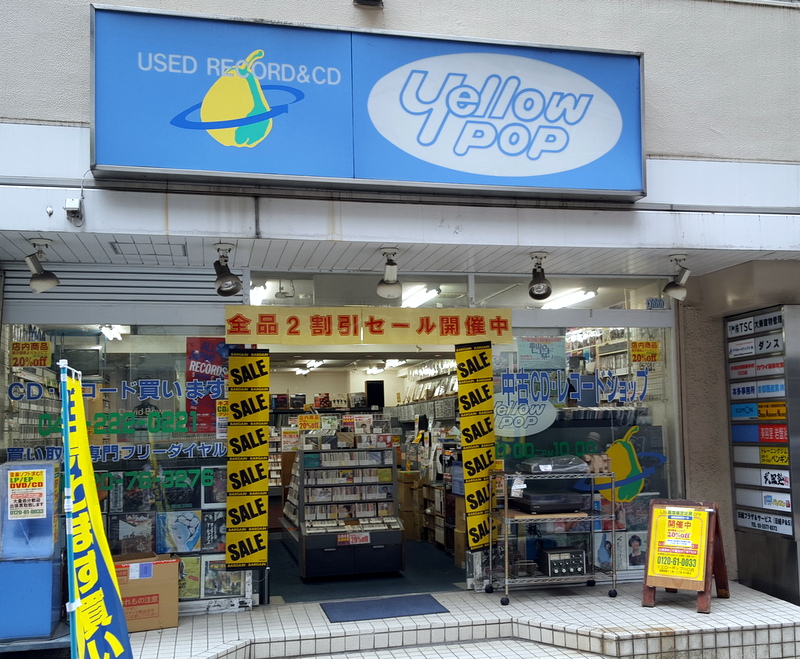
Anyways, just one stop removed from Akabane is Kawaguchi, hop off there and head towards Yellow Pop, the last of what used to be a small chain of stores in the greater Tokyo area.
Now, I don’t mean to make assumptions about anyone, and I know that stereotypes are harmful, inaccurate and in the worst case scenarios, even damaging to individuals and cultures. I know that, I understand that. Okay?
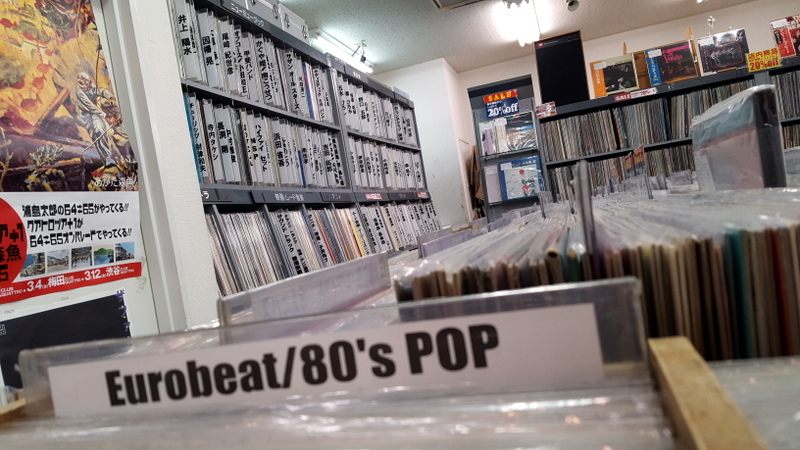
That being said, if one of the people who runs Yellow Pop didn’t work as a DJ for gay nightclubs in the 80s and 90s, he certainly gets records from someone who most definitely did. I mean, they have a eurobeat section that goes six crates deep. Hell, their eurobeat section has a sub-section dedicated entirely to Dead Or Alive. Of course, keep in mind I’m not saying any of this derisively. I think this place is dope. And fabulous.
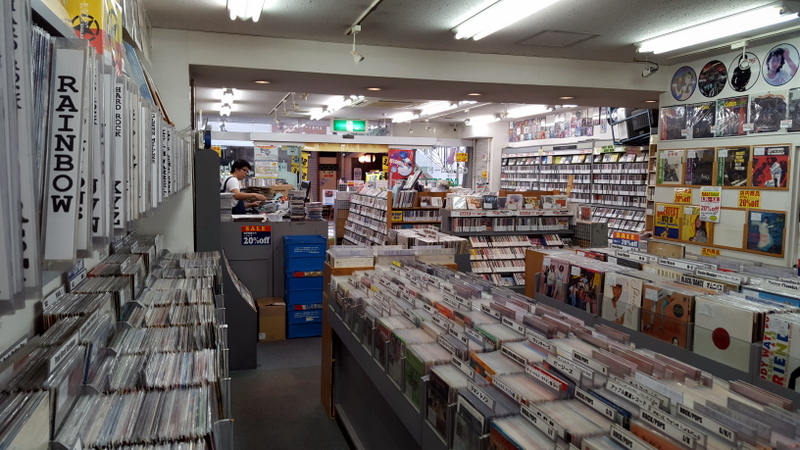
Its quality selection extends past just gay nightclub friendly dance hits though. Classic rock, 80s pop, hip-hop 12″ singles, the stock here is wild and goes deep with obscure cuts and hard-to-find material. They even carry a nice selection of anime soundtracks and Japanese pop. All that, and the prices are fair too, much cheaper than what you find in the city proper. Absolutely, positively a must visit store for damn near anyone looking for anything remotely pop or rock related in the least. Fantastic.
Kita-Urawa/Omiya
Hop back on the Keihintohoku line and head north a few stops to Kita-Urawa. It’s a sleepy part of town (and eat before you get here, I couldn’t find a decent restaurant to save my stomach), but not too far west from the station is a ginormous Disk Union.
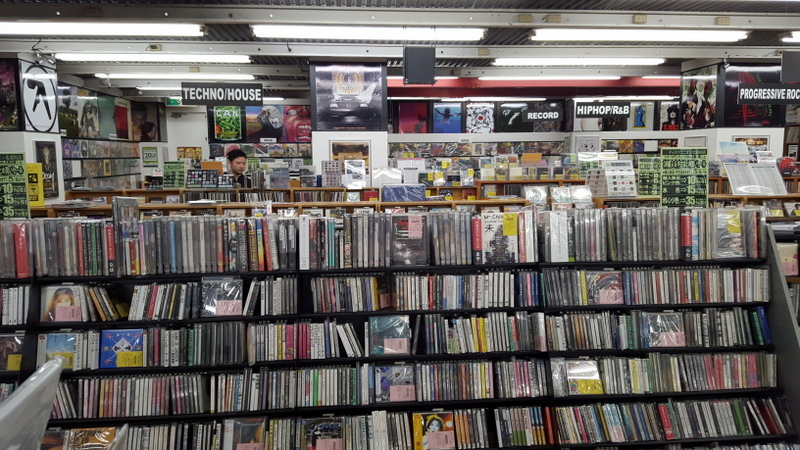
It’s just huge, bigger than any Disk Union in Tokyo unless you count the seven or so Disk Unions in Shinjuku as one store. It’s so big that I couldn’t pin down a specialty, but I would say that they have more dance and electronic music than your typical general-purpose store. They had a copy of Aphex Twins’ Drukqs on vinyl when I was there, that’s usually my sign of a record store meaning business when it comes to electronic music. But even if that’s not your thing, this place is just stacked full of records. Oh, and across the street is the Saitama Modern Art Museum. It’s great, despite the lack of English signs, get yourself cultured!
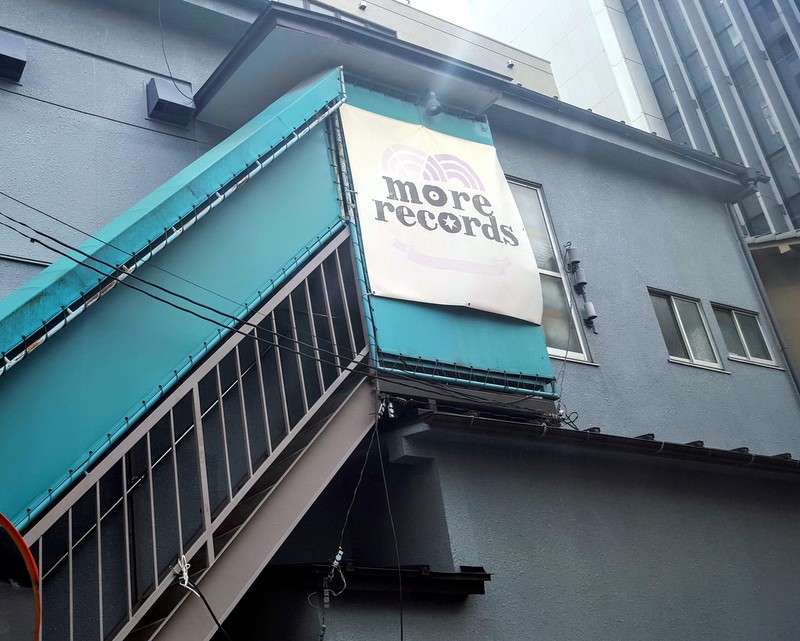
And if you’re really committed to exploring all that the greater Saitama area has to offer, you can go a few more stops north to Omiya. Here, you’ll find another Disk Union (it’s okay) and another Book Off Bazaar (it’s really big) as well as two offbeat stores. The first, wonderfully named More Records, is one of the more unique stores you’ll find in the city.
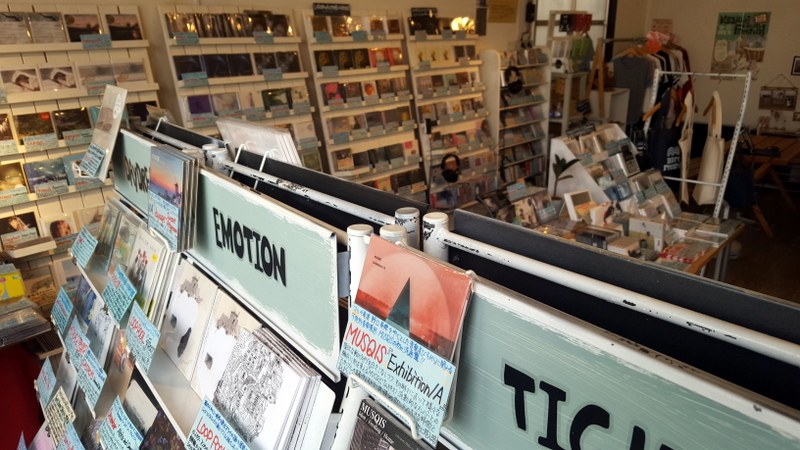
Almost exclusively CDs, More Records has one of the most particularly (and peculiarly) curated inventories I’ve ever seen. Their limited stock is separated into incredibly specific and narrow categories, of which the names make little-to-no sense, like “Fine,” “Chaos” and “Dream.” Cute for sure, but not entirely helpful when it comes to browsing. Thankfully, they have listening stations abound, so you can sample before you buy. As a whole, the store has a very eclectic electric vibe, I bet the dude who runs the place freaking loves Sigur Ros. It may be a bit on the hipster end of the scale, but it’s a cute place, and certainly unique.
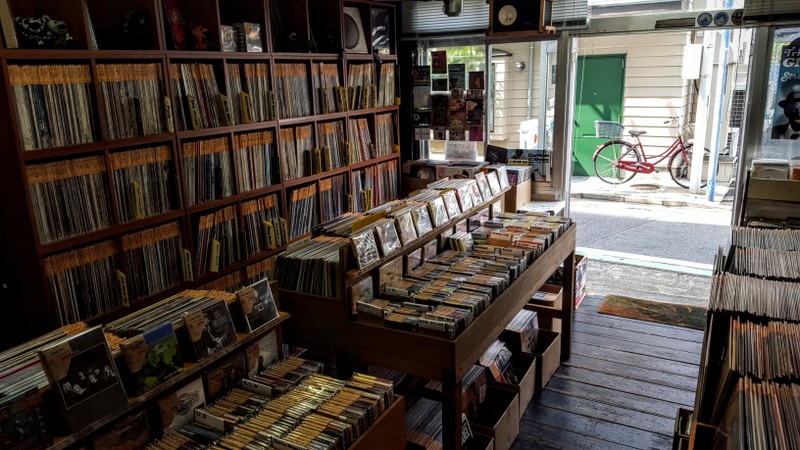
Around the corner and down the street is the decidedly different Record Shop Guriguri, your much more typical used record store. Small but packed with wax, it’s very well organized and its inventory runs the gamut, with a deep selection of pop genres and jazz. The owner is a chill dude too, speaks English pretty well, and is open to chatting. It’s also the only store I’ve seen in Japan that has a Grateful Dead section.
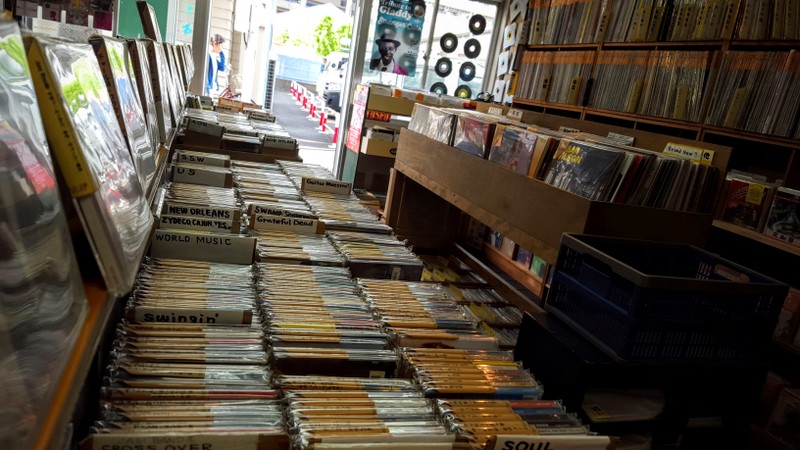
Weed’s not really big here y’know.
Part V – Everything Else
I tried my best to tie the outlying areas together, so you wouldn’t be hopping across town and wasting time. But remember how I said Tokyo is big? Yeah, it’s big, so that plan can only get you so far.
Here’s everything else I found during my travels in Tokyo and the surrounding areas. Some of these stores are amazing. Some are horrible. So, best read up first.
Koto
Here’s where you’ll find another store that’s a bit of a trek to get to, but might be worth it if you have the time and it meets your interests. Downtown Records is a weird store, nearly as out-there as it’s location, which is smack-dab in the middle of Koto, a neighborhood in eastern Tokyo known for…not much to be terribly honest.
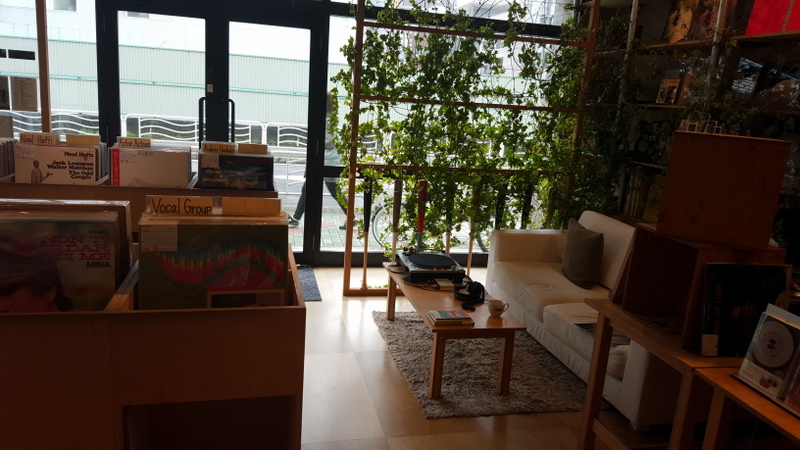
Thankfully you can get there relatively easily, it’s just 20 minutes or so from Shinjuku Station, and it might be worth the excursion if your tastes line-up with what the store has to offer, which is mainly “lounge” music, jazz and a slightly off-kilter selection of western rock from the 60s and 70s. The whole place has a weird feeling, like it belongs in a Wes Anderson movie or something (in fact, there’s a framed copy of the Rushmore soundrack behind the cash register.) Interested in finding some early Moog music for a shindig at your retro-flavored apartment? This is the place for you. Looking for Japanese music or anything with a bit of an edge or underground sound? Maybe skip it.
Ekoda
Ekoda is a small neighborhood a few stops west of Ikebukuro. It has a trendy vibe, and I bet that in 10 years time it could become the next Koenji or Shimokitazawa. Right now though, it’s a sleepy little burg without much to offer, except one the best kept record store secrets in Japan.
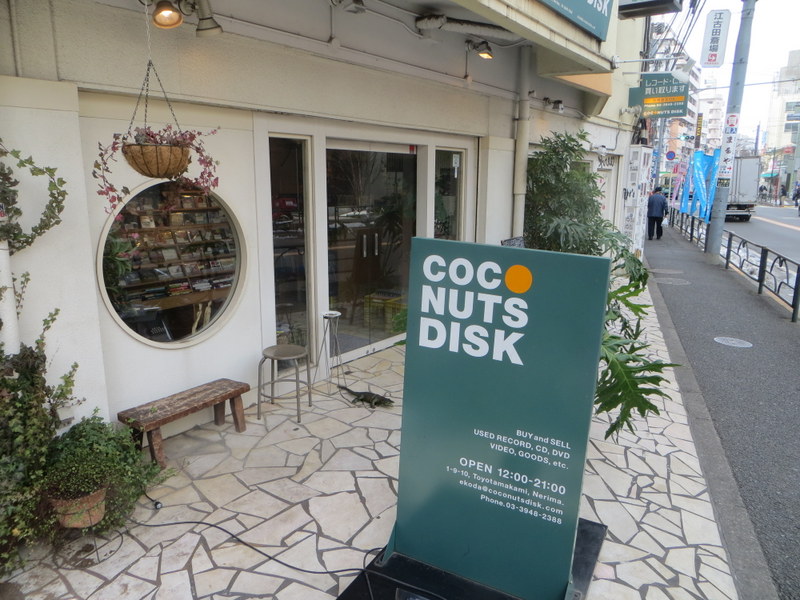
For whatever reason, the absolute best of the Coconuts Disk record stores is located in Ekoda. Yes, while other stores in the chain are located in major shopping areas like Kichijoji and Ikebukuro, this one, out in the middle of nowhere, is the best.
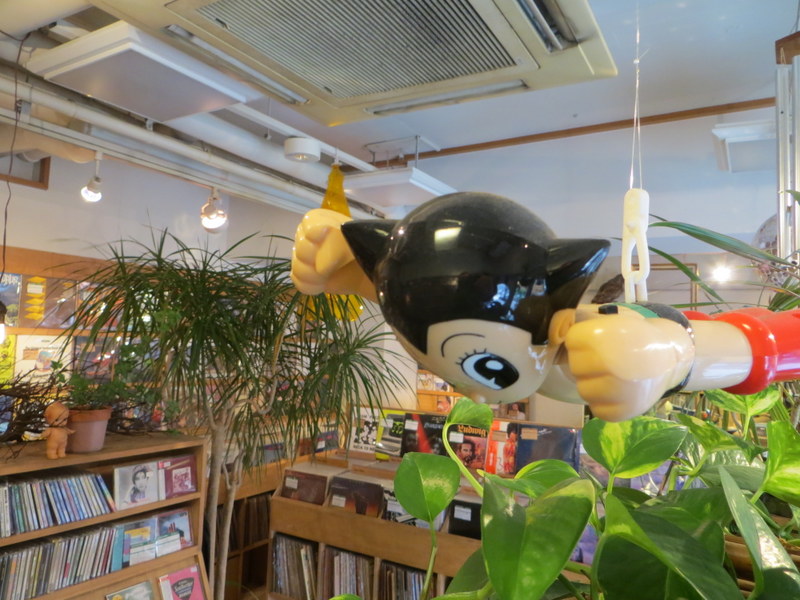
What makes it the best? Simply put, its consistently stocked with a shitload of awesome records and CDs in pretty much every genre imaginable. Great soundtracks, obscure Japanese electronic music, mainstream rock, rare disco, you name it, they probably have a bit of it. And it also has a fantastic atmosphere, with a seemingly rotating set of quirky and oddball decorations spread throughout the store. It may be a little isolated, but it’s not that hard to get to nor that far away from Shinjuku Station, making it more than worth the trip.
Musashi-Koyama
South of Shibuya is Musashi-Koyama, home of a ridiculously big covered shopping area, filled to the brims with the most boring shops imaginable. Right by the station is a little record store called Pet Sounds. Yes, they like the Beach Boys, and while it’s not really a classic rock/oldies-focused store, walking through its doors are a bit like going back in time several decades, when you could find small, locally-owned record stores that focused a bit on everything instead of focusing on one niche. If I lived in Musashi-Koyama I’d probably go to this store every week. They carry new releases and have an interesting selection of CDs. But there’s no reason for a tourist to make the trip out here. Everything they have here you’re just as likely to find in a Disk Union. Skip it.
Kawasaki
For such a big urban area there sure as hell isn’t a lot out here. You got a Book-Off, and while it’s decent it really doesn’t hold a candle to the superior Book-Off Bazaars you’ll find in places like Machida or Tachikawa. Aside from that, I only found two indie stores. One is called Tops and it seems fine, but it’s mostly a jazz store, and as I know next to nothing about jazz, I can’t say if their selection is good or bad. It was certainly big.
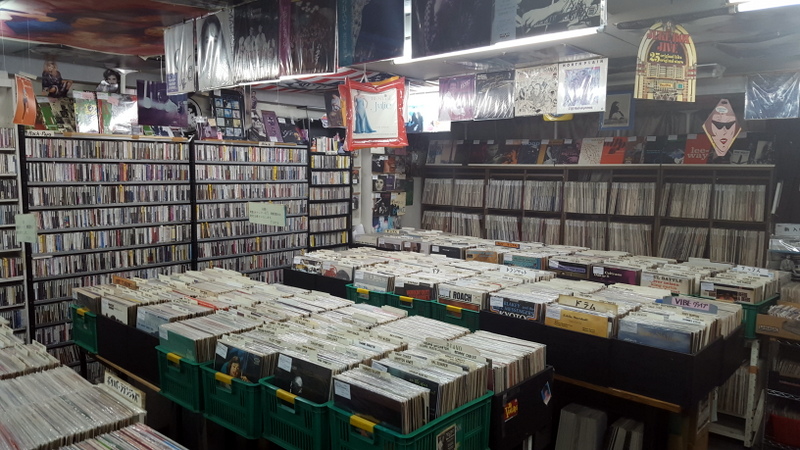
A couple stops away outside Kunata is a indie store by the name of Etcetera Recrods. It’s a complete and total shithole, crammed to the brim with boxes of records, all filled impossibly tight and in no discernible order. This might actually be the worst record store in Tokyo.
Tokiwadai
Here, in the middle of nowhere, we have Record Shop Tokiwadai. I’m of two minds on writing about this store. It’s kind of out of the way, the store is run down and there’s nothing else in the area worth visiting.
However, holy hell this is a weird little store. Judging by the prominent LD (for Laserdisc) on the store’s canopy, I would say that this place has probably been open for the better part of 30 years. And judging from the condition of the interior, that’s probably the last time the store was thoroughly dusted as well. It’s kind of a mess. Strike that, it’s a mess. The guy has so many records that he has to keep most of them outside. And unfortunately his selection, while vast, isn’t exactly bursting with quality. Yeah, I found a few good 80s Japanese releases here, and he has a few hundred 45s that might be of interest to singles collectors, but a lot of the racks are filled with your standard used record store rejects, classical music, 70s rock, soundtracks to movies like Camelot, nothing you can’t find in the states.
But this store has a charm to it that’s hard to deny. The owner is a sweetheart, and will use his limited English to try his best to converse with you. Additionally, he has a pretty good selection of old toys, memorabilia and manga strewn about as well. So if your tastes include any of those things then you might want to swing by here as well.
He also has a wall of Japanese porn. From the 80s. On VHS tape.
I seriously considered buying some of that just to examine the aesthetic.
Kitasenju
It may be called Fandango, but this place is all about the metal. AC/DC posters coat the walls, and I walked into the store only to face Halford’s blaring yell bursting out of the store’s soundsystem. That being said, I bought some anime soundtracks, a Lords of Acid 12″ single and some obscure Japanese electronic music here.
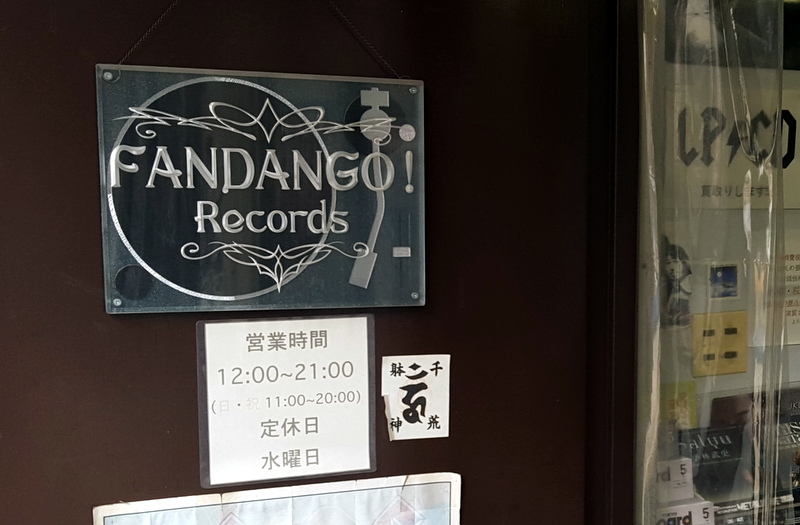
Its focus may be metal, no doubt about that, but you’ll find plenty of other great used stuff here too, covering pretty much every genre imaginable save for jazz and classical. The store is a bit on the dingy side, but don’t let its appearance deceive you, the records are all perfectly categorized, making it very easy to hunt down what you’re looking for. The store owner also speaks pretty good English as well, so that’s a bonus.
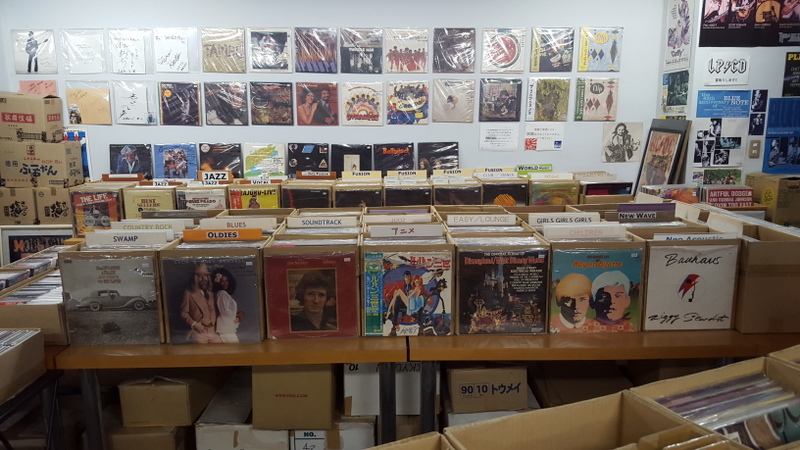
The only downside to this place is that it’s also a little far from the beaten path, and will take you a little over half an hour to get to from Shinjuku. There’s also nothing else of note in the area, which means you’ll be taking an hour out of your day to visit a single store. Still, it gets my recommendation, not only for its incredibly diverse selection, but for its character. Not often you find a store still selling VHS bootlegs of Nine Inch Nails concerts.
And the owner has a Charles Bronson fetish that just begs some questioning at some point.
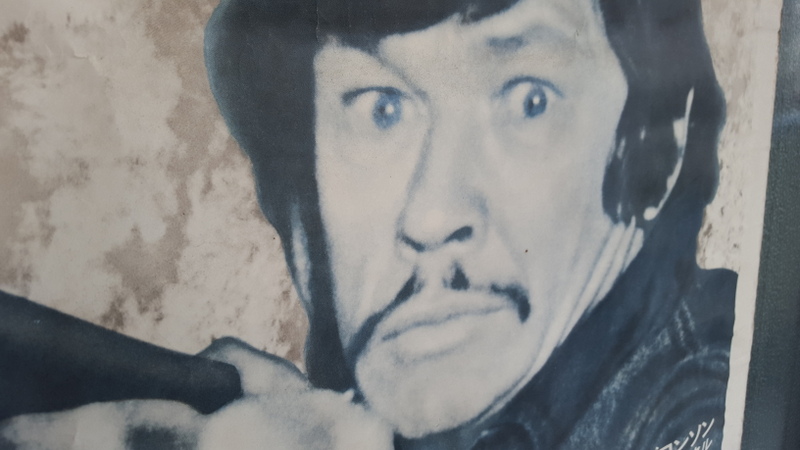
Etc. and Updates
This guide is 100% up to date as of November 25th, 2019. If you use this guide and find that any stores on it have gone kaput, leave a comment and I will remove them. Heck, I had to remove a store halfway through writing this thing. Retail is a mother.
Additionally, feel free to leave a comment or get a hold of me on Twitter if you have any questions about anything here, or if you want to recommend a store! I didn’t mention every store in the greater Tokyo area here, maybe you know about one that’s a must-visit that I somehow missed. Maybe you know a real crap one that people should steer clear of! Let me know!
More importantly, if you do find yourself in Tokyo, make sure you really take the city in and explore it for everything it has to offer, and not just records. Go to Ueno Park and take in the museums. Check out some shrines and temples. Chill out at a cat cafe (cat cafes are dope). But most importantly, go off the beaten path! Explore! Take a chance in an off-beat bar with a Japanese-only menu. You’re in the safest major metropolis in the world, and the greatest city on Earth. You’ll never know what you find if you dig deep enough.
Oh, and buy a lot of records.
Updates
10/26/16 – Added information on the Shinjuku HMV.
1/15/17 – Added information on Waltz in Naka-Meguro. Sadly removed Jar-Beat Records as it seems to have moved to online only.
4/2/17 – Added information on Kichijoji HMV and General Record Store. Also added updated hours info for Ballroom Records.
6/21/17 – Updated information on Janis to reflect its now seriously downgraded status.
11/2/17 – Sadly removed Manual of Errors Sonata, as it is no more.
2/14/18 – Added information on Marquee Records in Mejiro.
5/9/18 – Revised the Shinjuku Disk Union information to reflect recent store moves and changes.
11/15/18 – Sadly removed the Yoyogi Coconuts. Added Jazzy Spot.
02/19/19 – Sadly removed Popolo and the amazing Yokohama Recofan (RIP).
03/22/19 – Revised the Shinjuku Disk Union information to add the cafe/bar and also added information on the vinyl floor at Tower Records.
11/25/19 – Added information on the PARCO Union Record, sadly removed two Rare Records locations (only two left!).
Pingback: 无解专题:7天30家唱片店——一个独立乐迷的东京黑胶淘碟指南 | 无解音乐网 WOOOZY
Pingback: 长文|7天30家唱片店:一个独立乐迷的东京黑胶淘碟指南 豆瓣一刻20170420 | 每日笑吧
Pingback: Visiting Japan: UniSA Japan Study Tour 2018 - Anime Inferno
Pingback: The Mecca Of Record Shopping - Wandering Lion - Featured article